#with its messages with its themes and with the conflicts it's set up
Explore tagged Tumblr posts
Text
Why Arcane's Finale Fumbled Pt. 2
In my last post, I argued that Arcane's second season was artistically beautiful and thematically cheap. I broke down where I believed the writers fumbled with Vi's, Jinx's and Viktor's characters, and how the conflict of season 2 should have centred around a war between Piltover and Zaun rather than Piltover/Zaun against Ambessa and cosmic robots. I asserted the the real let-down of Season 2 had to do with its themes and its refusal to commit to the political story it had set up.
Well, folks, on further examination, it actually looks worse than I thought, and I'm going to use two characters--Silco and Mel--to break down what makes the message of Arcane so hollow and even a little dangerous.
Let's get into it.
Silco: The First Proposition

Silco and Vander:
Silco is a character CENTRAL to the themes of Arcane. The setup of the entire drama of the show, the central theme, are these questions: what is the price of progress and are we willing to pay it? Should we pay that price? Or as Silco says it quite bluntly to the first kid we see him give shimmer to: “Real power belongs to people who are willing to do anything to get it.” This story isn’t merely about ambition, but a dialogue on what actual progress costs and looks like. What does a better world look like? Is the better world we’re fighting for better for us or others? And what (or who) are we willing to sacrifice to achieve that goal? Vander, when faced with that question on the bridge answers, “No dream is worth the loss of those we love.”
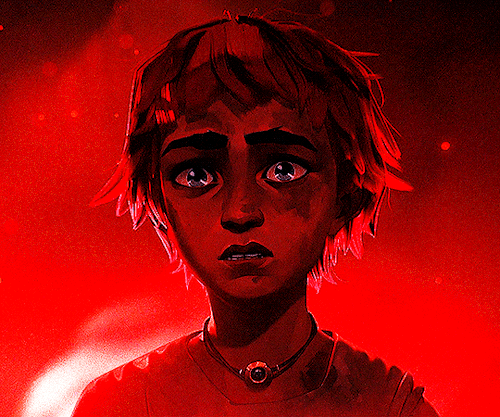
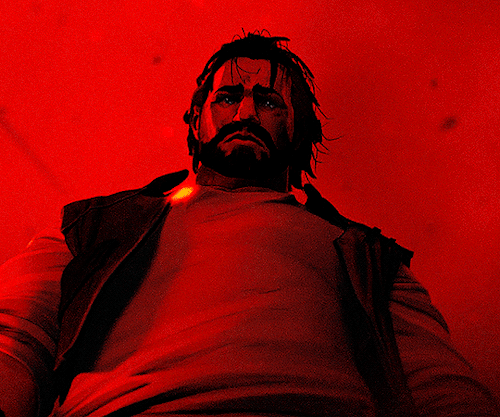
The death on the Bridge of Progress during the early war/conflict had too high a cost to Vander. Silco, however, “had enough.” Unlike Vander, what happened on the Bridge of Progress radicalized him. Silco, while being drowned by Vander, realized in that moment that he would do anything, not just to live, but to achieve his dream of a free Zaun. With or without Vander. Even if he had to sacrifice Vander. And we soon see, that while Vander dedicated the rest of his life to keeping the vulnerable in The Lanes safe (even if it meant making deals with enforcers), Silco was willing to throw citizens of The Lanes to the wolves on his way to achieve independence for Zaun. Silco calls it, “The necessary violence for change.” And in this episode (3 of Season 1) Silco sets forth a proposition for the entire show: does the path to a better world require violence?
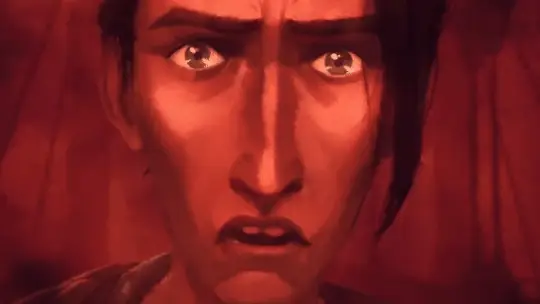
Silco and Sevika:
Silco’s new approach to crossing the bridge of progress, the path to freedom is winding and twisted. Silco embraces that, because only the goal matters: an independent Zaun. Silco won’t be at the mercy of the Council or anyone in The Lanes, and Sevika is into that shit. We saw that she percieved Vander as weak and servile to enforcers. Who she deems abhorrent without remorse (Vander and Grayson are both despised by Sevika and Marcus because they are percieved as being too lenient with their enemies). Silco, however, has an ACTUAL plan.
He creates a shimmer enterprise because having this control not only gives him a monopoly on The Lanes (and the gangs within), but leverage when it comes to manipulating the Council. Violence and the threat of war are the official languages of both Zaun and Piltover. It is how anyone bothers to listen to Silco both in The Lanes and within the Council. We know that the rich Piltovians (like those IRL) only speak money. “Progress” to them is prosperity and legacy (and I’ll get more into that later).

By creating the shimmer enterprise, Silco not only gets his foot in the door, monopoly over the other gangs and factions (thus uniting them), but a metaphorical seat at the table. His name has weight now, which positions him to make demands of Piltover and give Zaun a thriving industry (at least when it comes to money). Especially because (as we see with Salo and Lest) shimmer is also used by the elites. Silco is a brilliant tactician who exploits the hubris of Piltovians (like Marcus, who wanted to be in charge so he can neuter Zaunites indiscriminately), and manipulates them to his own advantage (much like Mel). But when Renni’s son is killed in the mines, Silco’s proposition is confronted once again: isn’t it easy to justify necessary violence when no one you love is the collateral?
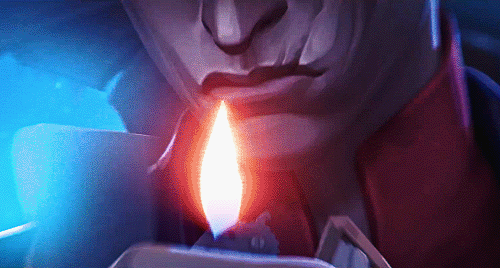
Silco doesn’t care about Renni’s son, doesn’t see himself as remotely near Renni’s position. When Twitch calls Jinx his “dog” (something Sevika herself wanted to do lmao), Silco gets twitchy. He doesn’t recognize any similarity between his relationship with Jinx and Renni and her son. Jinx is not someone he would ever consider as up for debate. Which was the point of tension between him and Sevika (a Sevika who’s loyalty he KNEW he needed in order to keep control, especially in the wake of Jinx’s volatility and unpopularity). Nevertheless, Sevika doesn’t betray him in that moment, because she still sees Silco as stronger (even though she believes Jinx is a weakness he needs to get rid of). As with Vander, Sevika views affection for their own at the cost of freedom as weakness.

Yet, funnily enough, she is fiercely loyal. She, like Jinx, is Silco’s “dog.” She shares his weakness, the weakness that makes her zealous for a better world in the first place. But what Twitch and Renni pose to both Silco and Sevika is the unsettling question of: are you really willing to go far enough? Or do you still see yourself as an exception? Regardless, when it comes to Silco’s proposition, Silco WAS SUCCESSFUL (and also accurate in his deductions on what would get both cities to respect him and eventaully give him what he wanted - Zaun). His determination and focus paid off, indeed, it’s hard to see how he could have been successful without the “necessary violence”. It is clear that he wouldn’t have. No shimmer, no independence. Silco, for all his gruesome methods, WAS RIGHT. Except . . .
Silco and Marcus:
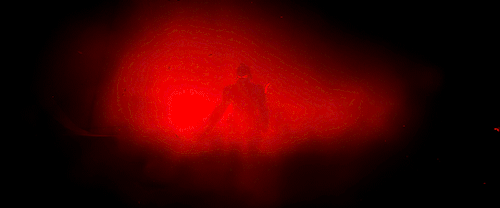
By exploiting and manipulating the vulnerable of The Lanes, Silco also ensured he would suffer the same fate as Marcus. Unlike Silco, Marcus did horrible things to protect his daughter. Marcus, at first, had started out as a zealous enforcer, eager to clean out the rats of The Lanes. Although he didn’t plan for Grayson to be killed, he was willing to get rid of her in order to ensure that he would get into a position that allowed him to do what he wanted to do: exterminate rats and be the hero of Piltover.
Silco offers him bodies for Stillwater in exchange for ease of shimmer distribution. Silco is willing to sacrifice his own people, the people Zaun is ironically for, in order to gain influence in Piltover. Silco, however, did the opposite. Because he loved Jinx, he recognized her deepest insecurity and sought to assuage it (inadvertently weaponizing it against her and those who loved her). He let Jinx get close and gave her responsibility so she could feel like she belonged (he let her drug his eye, a delicate process, while she was still thought of as reckless and untrustworthy). He brought her deeper into the heart of the violence and taught her to embrace it. He made her a child prodigy of warfare.
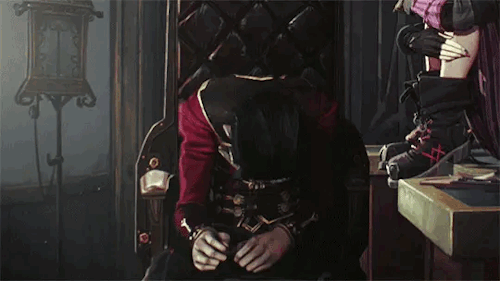
He takes a different approach to Vander (who kept telling the kids to stay out of trouble where they could and used himself as a buffer). So was Silco wrong? Was Vander? The answer was, quite poetically and profoundly, their deaths and the resulting silence. Both died, more or less, at the hands of their daughters. This is something overlooked often by fandom. It was Vi’s choice to lead her brothers and sister into Jayce’s apartment that would eventually bring the enforcers down to The Lanes, sparking the chain of events that would lead to Vander’s death (or had things gone “well,” his arrest). Vi is also how Powder got the arcane stones in the first place. Vi’s encouragement (well-meaning and innocent as it was) played a hand in the disaster that followed.
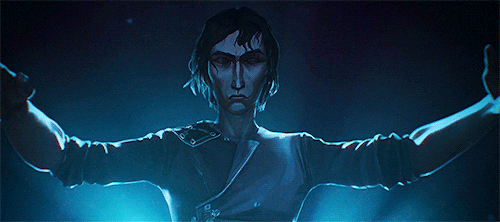

But the fact that both Vander and Silco die regardless, paints an excellent portrait of the constraints of oppression. Both tried different methods when it came to rearing their daughters. Both methods got them killed and thrust their children into peril. Vander could only have shielded Vi for so long, and Jinx could only have taken so much so young before she broke down completely. The fate of the girls is not merely their fathers’ fault, nor their sister’s. The tragedies of their lives happen due to the simple fact that they were born in The Lanes. No choice, on either Vander’s, Silco’s, Powder’s or Vi’s mattered in the end.
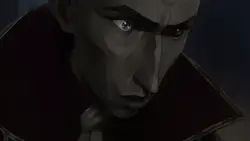

They were always playing a losing game, which is what makes it so fucking INFURIATING when S2 comes along and suggests that “ACKTUALLY the reason everyone’s happy in Ekko’s AU is because Vi died/hextech was no more/Silco and Vander made up).” All of those were symptoms of the bigger issue, not the issue itself. And that is the horrible irony of Silco’s story. He WAS right. But his folly was viewing himself and those he loved as exceptions to the rule. For when Zaun demands the final price, when Jayce asks for Jinx in exchange for his dream being realized, he isn’t willing to pay anymore.

Marcus only crossed the bridge of progress into Zaun for the sake of his daughter (as is shown in a chilling scene where he finds Silco playing with her in her room). Likewise, when Silco FINALLY finishes, after all those years, his march on The Bridge of Progress, like Marcus, he dies in a swarm of bullets. But unlike Marcus, he is afforded time to tell his daughter, “I wouldn’t have given you to them. Not for the world.” Not for his dream. So what did Season 2 do with that?
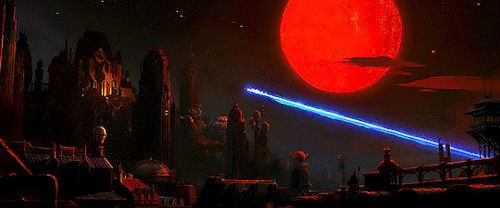
Summary of Fumblings:
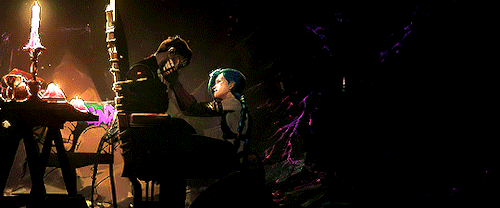
-I’ll tell you what Season 2 did. Season 2 took the biggest shit on one of the most fascinating characters in animated history. The reason I didn’t put that much critique up there was to show you how complex, layered, deep and thoughtful Season 1 was with Silco’s character. Silco in S2 became a cheap gimmick flung in our faces like the marketing team was trying to sell Silco plushies following the release. His back-story in Season 2 clashes horribly with Season 1. If Vander, Silco and Felicia were such chums back then, why did neither Silco nor Vi recognize each other when they met in Season 1? They were quite grown by the time the March on The Bridge of Progress happened. Honestly, there’s too many mistakes and inconsistencies with how Season 2 handles the backstory I don’t even see a point in getting to it

-(excerpt from one of the writers) I can't BELIEVE MY FUCKING EYES! Silco’s respect for Vander, despite the fact that Vander tried to drown him (most likely after the carnage on the Bridge of Progress where Vander realized the cost of war), was that Vander remained dedicated to Zaun’s independence, at least, until he began prioritizing the safety of the children over Zaun’s freedom. Silco’s respect for Vander had never been a goal or motivation. Silco never expressed any desire to be respected by Vander. He merely expressed respect, ONLY because Vander, up until he became the enforcer’s “lapdog,” shared his pursuit of a free Zaun. Silco killed Vander for the same reason Vander tried to drown Silco: they had become a threat to what they held dear - Silco, his pursuit of Zaun, and Vander the safety of his adopted children.
-”We build our own prisons. Bars forged of oaths, codes, commitments.” This conversation is SO FUCKING—rips into mattress and pulls out stuffing Jinx hallucinates Silco from within the cell she’s in at Stillwater, maybe the same one Vi had been in. Silco starts off saying something like “It’s funny how Marcus thought putting Vi in this cell was a greater mercy than killing her,” cluing us in to not just Jinx’s mental state but the very real torment it must have been for Vi as a child as well. SO JUST TO RECAP, WE ARE TALKING ABOUT THE PRISON OF THE CYCLE OF KILLING AND VIOLENCE, OKAY. In addition to that already horrible quote above, Silco says, “. . . and it will continue, long after the two of you.” So, folks, IN CONCLUSION, this cycle of violence (which I have already established like a fucking broken record is EXPLICITLY started and perpetuated by Piltover) is eternal and inevitable. Just let that fucking sink in. Let it settle nice and sour in your gut and then tell me how that GERD feels. Not only is that an appalling thing to suggest about any oppressive regime, it’s also untrue. Yes, humanity has not gone a decade without some form of conflict and struggle, but individual societies have been PROVABLY capable of both progress and regress. Both of which require the agency and active participation of others. And Arcane seems to want to show that progress is indeed possible, but it has already declared it, to some extent, a pointless pursuit in this conversation. Which is it, Arcane S2 writers? Is progress worth striving for, or is it pointless? “Oh my god, you’re so dumb ratatatouille!” you say. “Of course they answered the former! Duh! In Ekko’s monologue when Jinx is trying to kill herself, he tells Jinx that someone special once told him that no matter what happened in the past, it’s never too late to build something new - someone worth building it for.” GREAT! DELICIOUS, EVEN! Now why is it that Ekko says this instead of Silco? Why isn’t this something Silco would say, given that this was the entire point of his and Vander’s story? That this is what his arc embodied and explored? “You’re so silly! Obviously Silco is a hallucination!” The show explicitly frames Silco as RIGHT and tries to tie in what Silco says with what Ekko says. More sympathetic viewers will say that since Ekko discovered that Jinx was never the problem, that hextech was, and that Jinx was actually the path towards progress - a path Silco had walked so she could run - Ekko approached her as someone he could finally save (and oh boy am I going to get into why that doesn’t work AT ALL later). Is is not Jinx, but the hextech, the ARCANE, that is dangerous. The hextech is the true jinx. It is what will keep the cycle going. That’s why Silco holds the arcane stone near his eye like that in the scene.
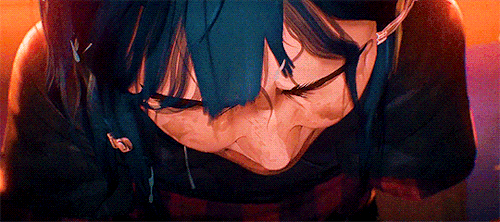
And to that I say . . . WELL THAT’S FUCKING STUPID. I don’t care that “Arcane” is the title of the show. It is the cheapest story gimmick I have seen since vibranium, except vibranium REMAINED a plot device and didn’t usurp the theme or political/interpersonal conflicts in Black Panther. Hextech was a PLOT DEVICE meant to be used to explore the themes which became the ENDPOINT. And this story SUFFERS SO MUCH from that simple change. This is why most critics of season 2 say the story should have remained focused on the interpersonal and political reasons characters did what they did, rather than siphoning all their stories into a mission to stop the evil, mystical stones. It is a fucking stupid distraction in S2, where in S1 it had been a beautiful metaphor, a fragment of a mirror that the characters held up to examine their faces.
But by claiming the cycle was the hextech all along, you just shat on everything that made S1 good.
Which brings me back to what Ekko tells Jinx, that she can still build a better world for the people she loves (like Vi, I guess). That’s why she comes back to help her sister. She cuts her hair (a symbol of letting go of the past) and joins Vi to defeat Ambessa and evil Viktor. This is treated as some kind of continuation (or the true point) of Silco’s “ending the cycle” speech. By letting go of Vi (literally) and Silco (also literally), she can finally . . . er . . . stop “running in circles.” So the show tells us she is BOTH supposed to fight one more time to achieve an autonomous Zaun AND fuck off to a new land to escape said cycle—which, what was the POINT of fighting if she still had to “escape” it in the end anyways?
NO S2 HALLUCINATION SILCO, JINX AND VI DID NOT BUILD THEIR OWN PRISONS. THEY SURVIVED THE CAGES THEY WERE PUT IN AS CHILDREN AND THEY DESERVED BETTER THAN THAT GODAWFUL DUMBASS SPEECH.
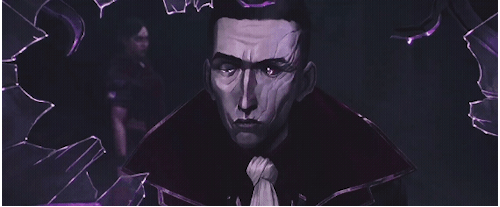
Do you see why this writing is so horrible? It contradicts itself so many fucking times, no matter how you splice it. Whether it’s about the cycle of violence being the fault of unforgiveness or hextech. None of it makes any sense because none of it was ever established in season 1 as being the cause for any of those things. And by even SUGGESTING that either or both of those could be the cause, the writers send us two very troubling messages: oppression is inevitable and also, somehow, the fault (rather than responsibility) of the oppressed. Actually no, I think the suggestion from the writers is even stupider: oppression is an option and you can opt in or out.
And that is the ultimate insult to Silco’s character and what he did for the story of the show.
Mel: The Counterpoint
Mel and Jayce:

Mel is Silco’s thematic counterpoint. In the story, Silco proposes that progress costs some “necessary violence.” Mel is faced with this same question as a child, when Ambessa presents her with the last remaining heir of a nation Noxus had conquered. Ambessa asks young Mel if they should kill or spare the girl. “Kino says war is a failure of statecraft,” Mel had said, when her mother told her about how her father had made her retrieve knives on the battlefield at ten so she’d know death. War, Mel is sure, is REGRESS not PROGRESS. It is the breaking down of the state, not the making of one. It’s obvious to Mel that sparing this girl, who looks about her age, is the progressive, less barbaric thing to do. Yet Ambessa insists, “Your brother thinks he can talk his way out of anything,” Likening him to being a fox among wolves when a good ruler needs to be both. To which Mel goes on to describe the kind of ruler the new conquered kingdom will need. A woman “with a kind, fat face to charm her subjects”, but moldable, to which Ambesaa basically says “So basically you? Cool. I’m down, but you have to prove yourself to me. Prove you can take it.” This is when Mel is presented with the ultimatum: choose to spare the girl or kill her. “We can show the people we are merciful,” she pleads on behalf of the girl. But Ambessa is firm. If Mel kills her now (a symbol of the old “regime”), she won’t (maybe) have to deal with any uprisings and kill thousands.
But Mel doesn’t swallow this poison, insists that diplomacy is the superior way, and is banished to Piltover, where she undertakes the task of proving herself. She tries to become the fox. She uses her kind, fat face to charm the Councilors of Piltover and utilizes Jayce to use hextech for Piltover so that her work in the city becomes impressive, cements her legacy as a Medarda, validates her as one of them, and ALSO proves her mother wrong, thus liberating herself from her mother’s cycle of violence and re-instating her rightful station as a worthy member of the Medarda clan.

But it’s not JUST that, though. Jayce’s enthusiasm to improve the world with hextech inspires Mel and validates what she felt so strongly as a child that Ambessa staunchly denied. When Jayce shares his dream with her, she goes all soft and says, “We’re (the Medarda’s) not often in the position to give back.” Which is . . . funny, lol. I think she was talking about herself rather than her entire family. Anyway, to Jayce, Mel was the one who gave him a second chance. He and Viktor wouldn’t have gone anywhere without her help. Jayce is likely the first person she’s felt capable of helping (especially outside Ambessa’s shadow), and likewise, Mel makes Jayce feel indominable (remember: “Nothing feels impossible when I’m with you”). Jayce makes her feel good about herself, hopeful that her ways can work. After all, being the fox has worked for Jayce and Piltover.
But Mel isn’t just the fox, and not for the reasons S2 thinks. Why? LONG before Ambessa sets foot in Piltover, Mel receives a letter from a correspondent overseas. She despairs that Jayce is not ready to be the success she needs him to be. Even after he confides in her about Viktor’s illness, to her it is not a personal loss. Like no matter what the meljayvik or melvik shippers say, Viktor and Mel DID NOT GIVE A FUCK ABOUT EACH OTHER OUTSIDE OF JAYCE. Jayce wants to uphold his promise in helping Viktor, the man who saved him from his own death (AND TRUST ME, WE’LL GET TO THAT) but Mel wants Jayce focused on keeping her investment and legacy IN PILTOVER safe from Ambessa.
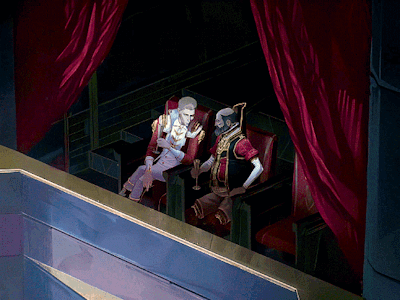
So what does homegirl do? She manipulates Jayce into creating hextech weapons. The reason she moves for a vote to make Jayce a councilor on Progress Day is in light of Jinx’s attack. The councilors are worried that someone in the undercity got their hands on hextech and can use it against them. Jayce, feeling responsible for the situation (and that probably having something to do with Caitlyn nearly dying in the attack), proposes to pause all hextech developments until the threat is neutralized. Instantly, we see Viktor’s and Mel’s reactions—panic. Both are running out of time. Mel to make Piltover a success (in that it is able to defend itself from Ambessa), and Viktor to help those dying in The Lanes. So Mel proposes Jayce become a councilor instead.
We next see her examining Jinx’s bomb with Viktor and Jayce. Jayce asks Viktor if it’s possible that Jinx could create something resembling hextech. Viktor, who is busy marvelling at Jinx’s ingenuity and feeling a little proud of his people, says very confidently that “It’s a leap.” Meaning it’s far away from what Jayce and him are developing. But Mel needs SOMETHING to intimidate Ambessa. That, or she recognizes the undercity as a real threat to her dream of progress and prosperity. Legacy. The undercity is ugly and she wants to neutralize it before she loses her chance. Regardless, here, we see her make the choice to be the wolf. The relentless and unmerciful. Focused and driven by her ambition. She will be a Medarda, unlike last time. Armed and prepared. When Jayce asks if she knows for certain that Zaun intends to turn the gemstones into weapons, Mel says, “That doesn’t matter. We’ll assume,” which pisses Viktor off. But then she performs the ultimate manipulation on Jayce. She uses Jayce’s care for the Kirammans and Piltover to convince him that it’s necessary to “protect your people” which, Viktor can tell, does not extend to the people of the undercity.

Once again, Mel is demonstrating that she doesn’t see Zaunites as people. She barely acknowledges Viktor when he protests, saying “That’s not what we invented hextech for!” She merely looks at him, then looks back at Jayce and talks to Jayce. She repeatedly ignores Viktor, talks over him, as if he isn’t there. Doesn’t matter. After all, Jayce is the only one in Piltover worth her time. Piltover is her project, not the dirty undercity. Mel had already sown the seed for Jayce’s rampage by the time Ambessa showed up.
“Stay away from Jayce!” she says, and yet Mel is what brought Ambessa close to Jayce both physically and ideologically. For hextech and Piltover (the City of Progress) to be safe, Jayce has to commit some “necessary violence for change.”
This isn’t only Ambessa’s fault, but Mel’s and Jayce’s errors as leaders. By neglecting the undercity, Jayce fails to see how his innovations could be weapons until it's too late. Mel is also so focused on Ambessa as a threat that she neglects the threat of the undercity, a place that only became a threat because of YEARS of failed state-craft.

Jayce acquiesces to Ambessa's rhetoric since the attack at the bridge, and proposes to the other council members to go into The Lanes with force, which they are all (including Mel) hesitant to do. But then Jayce goes ahead anyways, and kills a kid (which we’ll come back to), and he not only regrets it, but does a 180 and returns, like Mel, back to his core values — peace and progress over prosperity or legacy. He makes a deal with Silco and then goes and tells the Council what’s up. Mel, now utterly convinced of her position, is the first to cast her vote in favor of an independent Zaun, and removes the Medarda ring while she does so, signalling her disdain for all the clan represents. Not only that, but she smears gold over the Noxian ships in her painting, which her mother correctly reads as a rejection of Noxus and an embrace of the Piltover her and Jayce want to build. Mel does not anticipate the attack, and Mel, in the last frame of the finale of Season 1, is the first target of Jinx’s bomb, the first councilor it was going to hit while her back was turned to it.
Mel and Viktor:
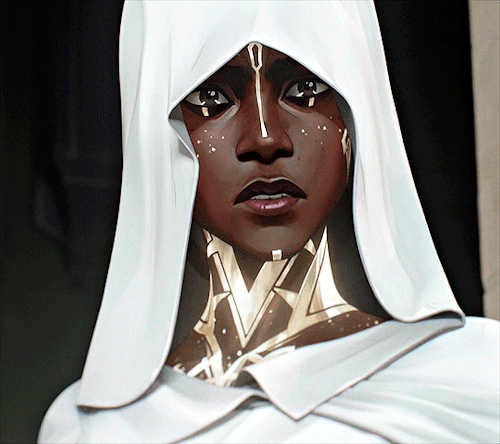
Mel’s parallel with Viktor is interesting. Mel’s interest in hextech (and initially Jayce) are to her own ends, later becoming altruistic (Viktor’s interest in Jayce also starts as an interest in his theories although his motivations were altruistic from the start). Jayce reminded her what she wanted to be in the first place. That her family name, like Jayce’s was to his, was a ball and chain around her neck. Holding her back from true progress. From a better world. A better legacy. Viktor comes from nowhere-land. Viktor doesn’t have a family legacy to inherit. Viktor is a Zaunite. And soon, much like Viktor, Mel is going to have to work hard to create her own legacy. Both Viktor and Mel are sort of outsiders in Piltover. As is shown in S2 with Salo, Piltover, the Fake City of Progress, has no accommodations for the disabled, which makes Viktor stand out like a sore thumb (also, Viktor is the one who made his own leg brace). Mel is a foreigner who has to make a name for herself before she can latch onto the Medarda title. Viktor wants the city to be good, while Mel wants the city (and herself) to look good by matching the strength and prosperity of Noxus.
This is why Viktor gets so sassy with her lmao. He sees through her manipulations and notices that she is pulling Jayce away from what they’d set out to do together (he is also annoyed at how easy it is for Jayce to forget). Mel is the one who tells Jayce it would be wiser to let the council members get away with their criminality (all while cracking down on The Lanes), which makes them wealthier, something that pushes Jayce deeper into his own prejudices against Zaun, where he starts seeing himself as primarily a caretaker of Piltover rather than hextech, as a councilor rather than a scientist, and it jeopardizes his relationship with Viktor.
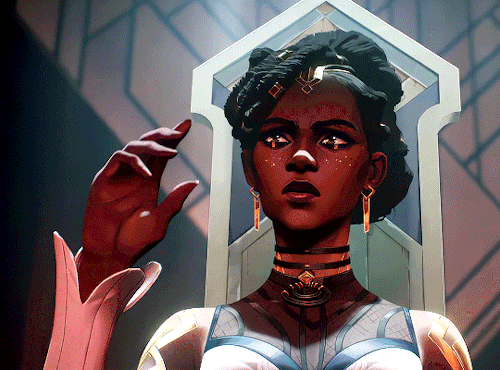
But Jayce helped her re-connect with the values all three of them shared deep down. The desire to help people and make the world a better place. After the bridge massacre, Mel wants to put her charm and diplomacy to good use, and she does so in the Council Room when she votes for Zaun’s independence.
But here’s where the FUMBLE happens. In S2, we see that Mel’s magic seems to have shielded Jayce and herself, but not Viktor. Not only that, but it’s hinted that Viktor’s magic is resistant to her touch. We don’t get any answer as to why that is (although I’d like to think that was Viktor being petty even while unconscious). This is especially weird since the arcane is alluded to be where the mages get their power (and isn’t it convenient that Viktor became a mindless war machine controlled by the corrupted/corrupting arcane instead of a mage when we see that in other universes he is indeed a mage already?). Not only that, but Viktor can clearly “touch” her magic through the puppet, later on.
Jayce keeps asking her why he was spared and Viktor wasn’t, and Mel, once again, cannot answer him. She knows that her magic protected her and Jayce, but once again, Jayce is lowkey asking why all these horrible things keep happening to Viktor instead of him. Why he is spared instead of Viktor. Unlike Mel, I have an answer. The answer IS PRIVILEGE JAYCE NOT THE FUCKING ARCANE AND THE MYSTICAL NATURE OF MAGIC OR SOME UNKNOWN FORCE OF FATE. Viktor’s tragedy was something that could be helped by both hextech and just Piltover not being a bunch of fucking asswipes. Viktor’s “bad luck” was actually just piss poor governance, or as Kino would say, “a failure of statecraft.” When Mel forsook her original ideals in order to pursue her mother’s acceptance and her family legacy, she did what all the other council members did: make themselves comfortable in places of power at the expense of the oppressed. In order for her to reclaim herself, she had to abandon Noxus and her dream of returning or belonging to the Medarda Clan. Mel has to choose between her family’s legacy and her own longing for progress and dedication to mercy over violence.

Mel and Ambessa:
While Jayce has to fight Victor (who is really now reduced to just another weapon Jayce created that’s gotten into the wrong hands - and more on THAT later), Mel’s task is facing down her mother. By removing the context of oppressed/oppressor inherent to the Piltover/Zaun dynamic, we fail to explore S1’s setup for Mel. IT SHOULD BE NOTED that the reason diplomacy worked for Mel and not Silco was because of their differences in power. When Viktor tells Jayce “There is always a choice” after Jayce expresses his doubts regarding what Mel said about the Zaunites making hextech, Viktor was talking about Jayce’s choice. Mel’s choice. Mel could have chosen to be diplomatic, even with the threat of Jinx. But instead she forsook her ideals in pursuit of her desire to become a Medarda and, like her mother in her dream, preferred to eliminate the threat rather than integrate (Zaun). Even if she back-tracked by the time her mom came back.

Mel has to face the fact that, like Jayce, she betrayed her values and initiated something horrible: the war she’d always dreaded and despised. Mel is why Ambessa heard of the weapons in the first place. But S2 doesn’t focus on this at all. It barely acknowledges it. Instead, Mel is sucked into the Black Rose and told she’s a mage and that her mother must die for the sake of nameless nations the Black Rose mentions. You see, Ambessa is a scapegoat. An excuse to halt and dissolve any meaningful discussion on Piltover’s (and Mel’s) hand in the plight of The Lanes.
By making Ambessa the big bad, the council members and other Piltovians complicit in Zaun’s desperation get a free pass. Both in the show and by fandom. In fact, Mel can now be regarded as a hero (one of the GOATs of Arcane, if I recall) for killing Ambessa, then being christened the wolf by her mother. We don’t have to reckon with the fact that for most of the time she ignored Zaun, and that when Zaun got her attention, her first instinct was to weaponize Piltover, saying, “The peace was already broken.” And I’m pretty sure the reason she did this was LARGELY for ambition, because not more than an episode later, she’s backtracking, insisting that Jayce doesn’t know war like she does, that they should simply give Silco what he wants.
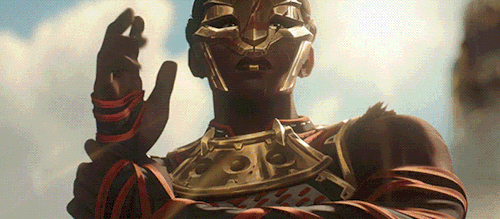
So Viktor was right. She wasn’t forced to create hextech weapons. She wanted to do it for her own gain. And Jayce rightfully gets mad at her in S2 when he recognizes her manipulations (even if he himself was complicit). He does, however tell her that “No one can control you and you’ll never be a passenger.” Once again affirming her incredible power—only this time, the focus is magic and not her political prowess. AND ISN’T IT CONVENIENT THAT MEL “DOESN’T UNDERSTAND” HER EMPATHIC POWERS SO SHE CAN BE TECHNICALLY EXCUSED FROM HER DECISIONS IN S1? HOW COOL IS THAT?!
Lmao when Mel starts lecturing her mother in the finale with “Mother, look at the price of your ambition,” it’s like . . . okay? You exacerbated this war long before your mother, girl. You were the one on the council for YEARS before she arrived. Mel, like Caitlyn, gets to play saviour while barely taking any credit for the fact that she was largely responsible for where Zaun and Piltover ended up (sis literally determined council votes singlehandedly). When Mel stands on the other side of the Bridge of Progress, she sees a trail of violence. She decides to cling even more firmly to her core values. Silco was right, but so was Mel. You see, diplomacy wouldn't have worked for Silco, but it could work for Mel, because Mel had power.
Summary of Fumblings:
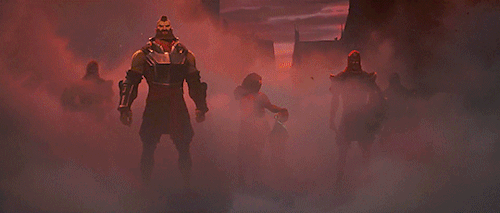
-And what was that, “(Piltover is) the city I built for my family” BS? By the end of S1, it is clear that Mel wants NOTHING to do with being a Medarda anymore. She wants to keep Noxus and Piltover SEPARATE. So why does she tell her mother, “You will never be a Medarda” as some kind of gotcha? Lmao, like why tf does that matter? How would she know? Why would she care? Other than her and Kino, what other benevolent Medardas are out there that makes her say this?
-The Black Rose warns Mel of Ambessa’s “thirst for legacy” (much like Mel’s) leading to a worldwide calamity. Mel wants to imagine that her mother prizes her own children over her pride, but the Black Rose insists that’s not true. That Ambessa is willing to sacrifice her children for more power and legacy. We do understand, however, that when Ambessa is confronted by the Black Rose, she is resorting to hextech so she can avoid using Mel (”she’s safer as our enemy”). AND THAT WOULD MAKE SENSE IF THE THIRD ACT ACTUALLY ACTED LIKE IT. How is Mel going to be this really great weapon that Ambessa doesn’t want to use because she loves her (which like, why didn’t she love Kino then if it wasn’t about magic?), but also simultaneously SENT AWAY TO A DISTANT LAND OUT OF HER WATCH? So now she’s hiding Mel, but she wants to pursue the arcane that is waking her mage-ness up and making it impossible for Mel to hide? Ambessa was literally there in the council room in the aftermath of the explosion. She knew Mel had used magic to protect herself and Jayce, but she didn’t do anything? Say anything?
Now most of this is clearly setting up another story in Runeterra (which means my criticism will ultimately be left to conjecture), so I’m going to focus instead on her last words to Mel: “You are the wolf.” The wolf being a symbol (at least in callback to season 1) of ruthlessness and fearlessness: the opposite of mercy. Why does her mother say this? Because Mel finally made a kill? Or because she killed to protect what she built? Finally embraced her power? Yeah, let’s go with that last one. Mel’s development in S2 becomes one where we focus on the power she’s always had, both magical and influential. Yet the show focuses more on the cool magic part than the rammys of Mel’s decisions in S1. It ignores her political power and frontlines her magical abilities, even making her political prowess partly due to her magical empath powers . . . like . . .
-Mel had dislodged her legacy from the Medardas by the time S2 rolls around. . . except no she hasn’t. In the end, Mel is sailing back on the Noxian ships she painted over, and she is doing so as the new Warlord (even wearing what looks like her mother’s cape) because she is the badass wolf, the leader that her mom wasn’t. And how did she achieve that power? Magic. Why does she want to go back? To reform the Medarda name? To take on the mission her mother couldn’t finish against The Deceiver? Because Jayce is dead? Who even cares at this point, this is mainly happening for the spinoff. It isn’t illogical, it’s just the least interesting approach to her character. Mel had much more agency in S1, and her political prowess made her formidable. But that doesn’t matter anymore.
-Her whole arc in S1 was all about her finding the courage to leave the Medarda name behind in pursuit of true progress, but then she kills her mother and sails away from Piltover, the city she fought to protect and killed her mother for and is all about probably reforming the Medarda name—and that’s her job done? Is it me, or is that a reversal of her—pardon the pun—progress? Also, she grew up in Piltover, it must be more of her home than Noxus ever was. Not only that, but making Ambessa go from an imperialist tyrant to this woman bravely fighting against a larger, more powerful threat cheapens what Noxus represented for me. Sometimes conquerors do be conquering, and they make threats up to justify their greed. Not the other way around. It’s not too egregious, but it would’ve been nice if the Black Rose had been more of an epilogue thing.
-sigh I know I’ve said it before but it’s because it’s true . . . the conflict should have remained between Zaun and Piltover and Ambessa was a cheap way out of what S1 was building up
-Ambessa was not who Mel needed to physically defeat, but someone she needed to ideologically defeat. And we don’t see any of that. By the time Ambessa calls Mel “the wolf” it’s hollow, because it’s about Mel being a more powerful combatant than a wise ruler. In this moment, her “foxness” is about how she figured out the “deception” of the Black Rose and not how she outmaneuvered her mother politically. Perhaps it would be epic if we knew what the fuck she meant by “I see your face deceiver!” and then super sayan-ing out of nowhere. Her not having mercy on her mother is about being a Medarda, a question that wasn’t the focus of season 1, merely a catalyst. Becoming a Medarda was the goal Mel had, not the need. She needed to learn how to rule. Instead, she learns how to kill. And then she’s off to her home in Noxus as more of a soldier and spy than a queen.
Which likely means two things:
-S2 got bored of Mel and just gave her cool reflective powers to make up for it. Making every interesting development about her character happen off-screen, in the writers room, or on another show.
-S2 was deliberately trying to communicate that it sided with Ambessa. That violence and combat, war, is not merely a failure of state craft, but necessary or inevitable to political growth. That militarism is the only thing that can answer militarism. That the only way to ensure the progress you make is secure is arming yourself. Even though this topic has some grey areas, Arcane explicitly picks a side by narratively using Ambessa to justify Piltover’s weaponization of hextech.
i know fandom has a lot to say about Mel being a “strong-black woman” character, but as a black woman myself, I hated how they stripped her of what made her such a strong, enigmatic presence in S1. Her prowess, her wit and cleverness. Her sheer intellectual power made her so FORMIDABLE.
She’s just a lost, hurt uwu little puppy for most of S2 before she’s given her US government assigned Avengers superhero uniform.
Mel in Act I was already using Lest to spy and we almost got a good story then—POOF!—Black Rose.
-Mel’s contribution to the development of hex-tech every step of the way is completely ignored. Instead Viktor and Jayce take full responsibility.
Conclusion:
Mel and Silco's arcs both ask: is violence necessary for progress? Both answer yes, but Mel's remains a little unsatisfactory. Because Mel had a choice. She had power. Power that Silco was willing to do (almost) anything to get. Both Mel and Silco's presence in S1 were formidable, and what made them so intriguing was there thorough understanding of people, both the good and the bad. But in S2, at least for Mel, what made her such an agentive character is thrust aside for spinoff hype. It's not that it isn't cool, it is. It's just one of the things that made S2 feel not only chunky, but disconnected from the roots of its story in S1. Both Silco's and Mel's characters in S2 reveal a very poor (or troubling) view of oppression, power dynamics and politics.
Anyway, that's just me. I was gonna do Ekko, Caitlyn and Jayce as well, but this post got too lengthy. I'll probably need to whittle it all down later. I've already cut so much.
#arcane#arcane season 2#arcane critical#mel medarda#jayce talis#jayce arcane#viktor arcane#mel arcane
809 notes
·
View notes
Text
Unhinged
Jason Todd x Reader

MDNI wc: 0.7K summary: your roommate finds your messages you send your friend about him. warnings: suggestive themes, no y/n used, actually kind of cringe a/n: my dear friend accidently gave me this idea while spamming me with delicious Red Hood edits (@dollyure), evidence will be shared at the end. enjoy!!

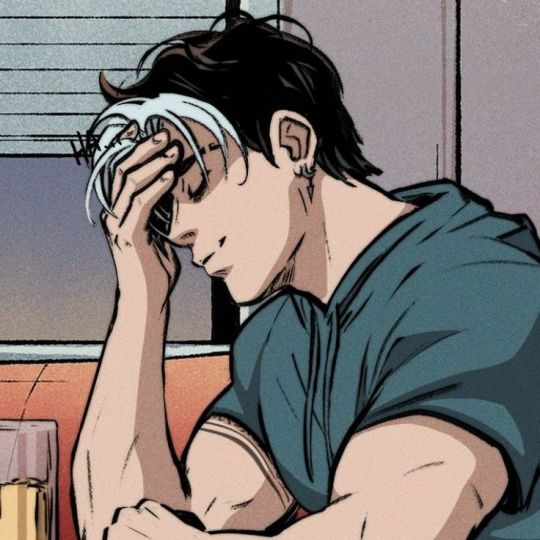
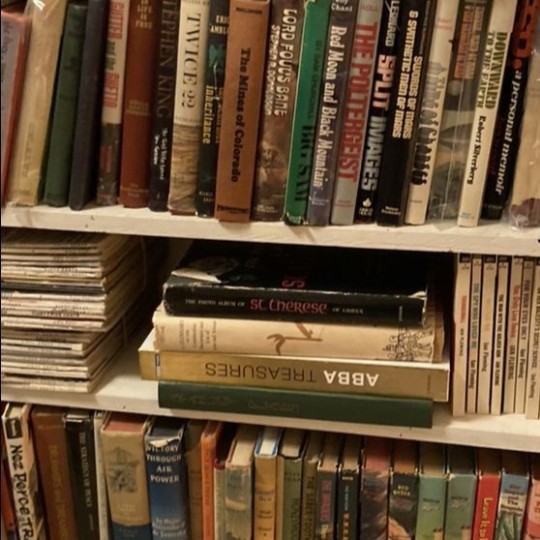
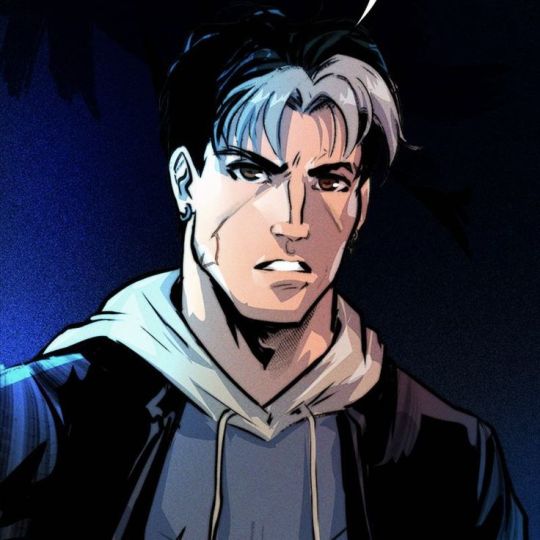
You never thought this could happen. You were so careful to leave your own thoughts to yourself and never let Jason see the things you tell your friend. But of course, nothing really goes your way for some reason.
It took one thing for you to end up in this situation. One thing. And that was leaving your phone unattented on the sofa for a minute. Unlocked.
It was a typical evening as any other, just getting to relax and wind down at the end of the week on your favourite spot at the couch with your roommate. Jason was always pretty quiet but respectful of the shared space, a good friend if you want to wind down together. You rarely get to see him in the evenings but on days like this, when he stays in, it feels like a small reward for you.
Of course he doesn‘t know about any of this. Doesn‘t know anything about what your silly texts between you and your friends. You keep it a secret pretty well, so he won‘t think you are a complete weirdo.
Well, until that evening. Setting your phone quickly aside to get to your boiling tea kettle, you forgot to lock it. Jason sits at the other end of the fluffy couch and watches how you scurry away to get the boiling water to a stop. With an amused grin he gets back to his book but keeps getting distracted by the bright phonescreen just a little away from him. Glancing over, he sees the outlines of text bubbles but he can‘t see what‘s written in there yet.
He isn‘t trying to pry or get into your privacy, but the way the other person spams you non-stop is making him more curious. Whatever this conversation is about, he wants to know if it‘s a conflict or some sort of gossip.
Jason checks if you are still in the kitchen and sees you preparing your tea and some sweets. He technically has enough time to snatch your phone while it‘s still open and gets to have a look over the texts. Who knows, maybe he will find out some interesting things on there. So, with these weak excuses, he grabs your phone and starts reading through them.
UNTIL YOUR TONGUE FADES COLOUR??? I mean every word I say. Wow. Just…
His brows furrow. What does this even mean? Are tongues even capable of fading colour? With a quick glance to the kitchen, he scrolls up, reading through the older messages.
From the couch, to the shower, to the bed, from the wall to the floor from missionary to cowgirl, straddled on top JUST LET ME HITTT
His jaw drops. Jason quickly composes himself and sits up, clearing his throat. He is sure he will need extra therapy after this. Ignoring the unfamiliar, warm feeling in his lower abdomen, he continues to read through them. Unsurprisingly, he finds a picture of himself in the chat. His profile picture, some random pictures he didn‘t even you had in the first place.
Until my throat memorises every vein.
That‘s the last message he sees from you before you appear in his sight again. Tea in hand, some cookies in the other. But most importantly, your flushed cheeks and regretful expression. His hand drops your phone and his cheeks also flush.
You can‘t look into his eyes anymore. This is the next worst thing that‘s ever happened to you so far. There is no way you can talk yourself out of this situation at all. He knows basically everything now. From the fact that you crush on him to the fact that you literally want to devour him whole.
Silently, he sets your phone back to its original spot and gets off the couch to stand up. Again, he clears his throat and speaks up first.
»I‘m gonna pretend I didn‘t see all this...«
And before you could apologise or say something to your defense, he is gone, retreating himself into his own room. Maybe even for the better, you can‘t imagine how awkward it would‘ve been if you were to sit next to him for the next few hours.

here is the so called evidence ( from my friends perspective)
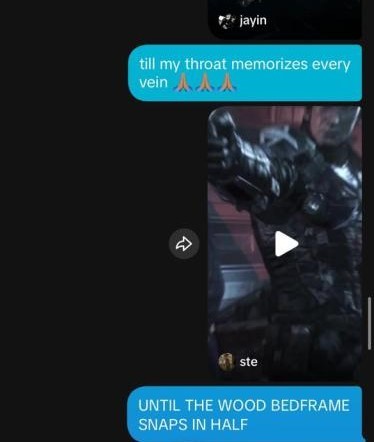
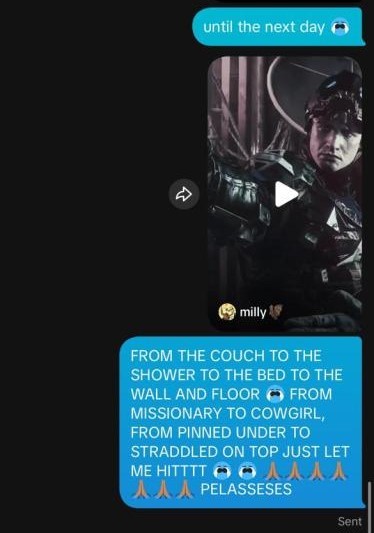
and this was the final message that made me do this:
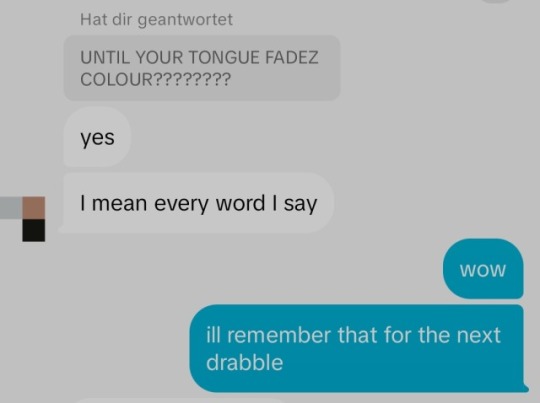
hope you enjoyed it somehow(★‿★)
part two
←MASTERLIST
#x reader#drabble#one shot#jason todd#jason todd drabble#jason todd x reader#jason todd fic#batfamily#dc comics#batfam#dc red hood#dc characters#dcu#jason todd fanfic
551 notes
·
View notes
Text
How Veilguard Handled Themes and Lost its Audience
This is tagged Veilguard-critical. I didn't set out to be critical (ie disparaging) of Veilguard, I set out to be critical (ie analytical) of one crucial aspect of its writing.
I reblogged a post by @meat-louse where I supported their premise ("this warped sense of history veilguard has") by pointing out how Veilguard can actually work to feel more integrated into the Thedas that we know from DAO, DA2, and DAI. Their conclusion is that:
"dragon age’s depictions of social issues were never spot-on, but at their best they encouraged the player to engage with those issues and ultimately seek to change society for the better. veilguard has no interest in changing society."
Here's my observations:
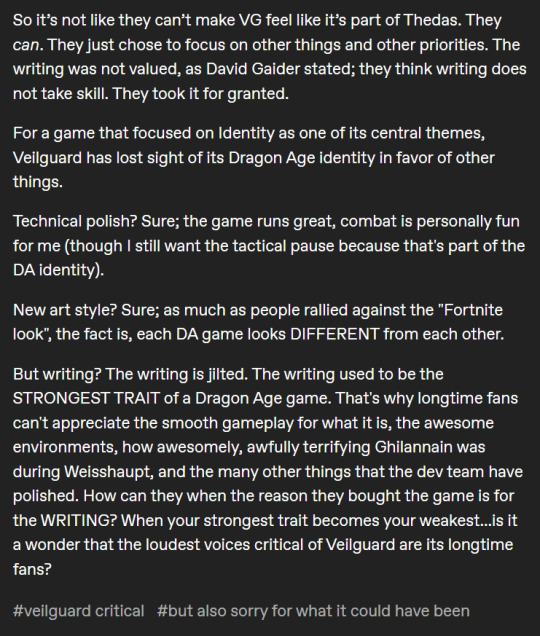
The issue is they want a game that’s simple and streamlined in its messaging. They want it focused on themes like regret and acceptance and teamwork and friendship. They hammered hard those themes, which, while it’s good practice to have strong themes, they overdid it to the point that we’re shouting “I GET IT!!!” They worked on those themes to the exclusion of nuance. To the exclusion of complexity.
Three games have trained us to look at the world and its problems, and look CLOSER because you’re not being told the whole truth. In fact there is no single truth. For every Anders, there’s a Cullen. You have the fearsome Arishok but you also have Sten, and for every hundred Sten who uphold their culture and beliefs unwavering, there’s an Iron Bull who knowingly subjects himself to reeducation in order to continue functioning in his society. And not far from him is an Adaar who is free from the Qun but faces the consequences of banishment and ostracization from their own culture and people. The game doesn’t say which side is right or wrong, you have to experience it for yourself to be able to have an opinion on the matter. My opinions on the Chantry were different when I played a Trevelyan versus as a Lavellan. Cousland has a different experience from a Tabris. That’s the point: your roleplaying changes depending on who you choose to be at the start of the game. The experience changes. The game is not interested in selling you a “correct” moral standpoint; it instead presents you a moral dilemma that unfolds through your questing, but it doesn’t give you an answer. It values a jerk Inquisitor, a stupid Warden, and a bloodthirsty Hawke as much as it values all the sarcastic, diplomatic, and traditionally heroic versions of our player characters.
But in Veilguard…
But in VG, all moral questions have already been resolved for you, either by signposting it, by not allowing you to interrogate these questions as Rook, or by completely ignoring it (no slaves, no tranquils, no alienages, no Circles, no cursed werewolves, no cults). They hyperfocused on their themes that they sacrificed nuance and complexity.
That’s why your companions and Rook only have low-impact conflict. Nothing will drive away your companions because they hold no strong convictions that clash with others. They serve the Themes. We can easily contrast this with companions from the other games: Vivienne gives you a closer look at the value of having Circles and the Chantry. Morrigan counsels expediency over do-gooding. Cassandra is has served all her life on the side of the "oppressors", but she questions the Seekers without letting it break her faith in the Maker. They have convictions. They were built from the ground up to be characters with their own agenda. They weren't built from the ground up to be your support system.
Which is what Veilguard appears to have done with their companions for the most part. I say the most part because there are three people with very clear themes, and Rook doesn't clash with them because their themes were designed to be very personal. The three are Emmrich (im/mortality and legacy); Bellara (something something preservation of the past, although I'm not sure what the point is because preserving the past at the cost of the present is not really very...cogent? Cultural/historical preservation is not exclusive to having a present and a future); and Taash (cultural and gender identity).
Talking to Taash made me reflect on my understanding of what it means to have a body you don’t agree with, perhaps even more than Krem did because with Taash, you can ask them. They will tell you. And that’s because Taash serves the Theme of Identity, both cultural and gender. BUT it’s also overdone to the point where those who don’t understand how it is to be trans feel like they’re being talked down to for not understanding.
What would have worked better is if they sparked the players’ curiosity and genuine interest in trans identity, and then allowed the players to engage with it as deeply or as shallow as they like. Instead everyone gets The Lecture as if we’re all uneducated on the matter. As if there are no allies among us. As if there are no shallow allies among us who are swayed by virtue-signalling. The Theme has swallowed what should be an invitation to talk and be curious and be enlightened.
Regret and sunk cost and redemption are also strong themes in the game. And you know they spent a long time and a lot of effort on that because the Team does a Talk Session after every piece of regret they uncover. Again: they’re made to serve the Theme to the exclusion of nuance and complexity. Yes, they raise good points, asked good questions, engaged with what we all saw. But I will argue that it’s US—the players—who should be having THAT conversation with ourselves or amongst ourselves. The companions should be there to give their point of view as a Mourn Watch, as a Grey Warden, as HARDING. But no—we don’t get that opportunity to absorb the regrets, to interrogate it ourselves based on what we know about Solas in DAI, or just to scratch our heads and say “okay but but but the game is always saying that history is not equal to the Truth and there’s always more to the story, so who can I ask / what other codices can I possibly find to shed more light about this?” Like…nada. You don’t make insights; the game already feeds you all the CORRECT insights so that you don’t ever have to be wrong about the Theme, because the Theme is Redemption or the Cost of Regret.
You don't need to engage your brain anymore because the game has already curated that for you. It has solved for you an equation that the past games would normally leave for you to solve through another playthrough. In DAO, if you only ever play Cousland, you will not grow your understanding of the plight of elves in alienages, or the injustice of the Dwarven caste system. You understand them intellectually because you are a person existing in a society that has poverty and injustice, but it doesn't hit the same until you play in the shoes of a Tabris or a Brosca.
Many of the writers who built Veilguard have been there in the construction of the other Dragon Age games. They were there when Veilguard was still Joplin. What we all wanted, they also clearly wanted to include in the game. They know it's not their role to dictate what players should believe by the end of the game, or to make the team generally harmonious and supportive of Rook. But their views and their skills were not valued.
Anyone who can write can write complexity.
Not everyone who writes can write nuance. That shit takes experience and skill. Writing is not just putting words on paper. This is especially true for massive collaborative writing projects such as videogames.
The writers failed because they were failed by the studio, first.
286 notes
·
View notes
Text
Why is Iruma still waiting for Kirio to come back?
Just some of my thoughts in regards to this question, what I think the future holds for them as well as what their story means to me personally.
This question has been plaguing the fandom ever since 304 came out. To many people the answer is clear: because Iruma is too kind for his own good and hopes to fix Kirio. This is also often followed by frustration: why can't he just give up on him? Clearly this guy is irredeemable, heck, that's kind of his whole point. He is a twist on the tired trope of a villain who has a sad backstory to justify his actions and then gets redeemed through the power of friendship. Why ruin this perfectly good thing?
Thing is, I really get it. I kind of hate this trope too, and I love Kirio as its subversion. I think the nastiest part about this trope is that it reflects a specific kind of mindset that a lot of people fall prey to in their personal lives. Some people who end up in toxic relationships may keep themselves in there for longer than necessary in hopes that they can "fix" the other person, that if they just stay kind and patient it will all be alright. But, of course, such self-sacrifice only leads to more suffering. It's important to be selfish, to set your boundaries and, if needs be, cut the other person out for good. Perhaps because mairu is a manga so focused on positive selfishness that this feels extra frustrating to some readers - not only does it reflect this harmful mindset but they also perceive it as going against its own messaging.
So, I truly get it. In fact, I would also probably share that frustration if I thought of Kirio as one toxic guy in Iruma's life and of Iruma's response as expression of that harmful self-sacrifice. However I personally don't believe that that's what their story is about and look at it from a slightly different angle.
Stories and storytelling generally follow certain rules and patterns. There is usually a protagonist with some kind of goal they want or need to achieve, there is some kind of conflict holding them back, 3-to-5 act structure with set up-development-climax-resolution, yada-yada all that jazz. These rules are not set in stone and you can and should break them, but it's also good to be aware of them and understand how they work so you can break them smart.
To me, mairu is roughly divided into two parts: pre-battler arc and post-battler arc. The reason why I split it like this is because initially the battler arc was kind of the deciding point for whether mairu gets axed or keeps running. (I am a little too lazy to add the source for this, but Nishi has mentioned this quite a few times over the years, so it's possible to dig something up with a bit of search. Or you can just check out my previous irukiri essay. In general, i believe it's a relatively common practice for manga that gets published in magazines). So initially the battler arc was written in such a way as to be a good ending arc and nicely wrap everything up, including thematically. Basically - go out with a bang. Hence the fireworks and school bombing. Because there is a clear ending point, I believe that the first part of mairu follows this logical structure of storytelling really well. The second part starts to go more wide than deep as Nishi is incentivized to keep the manga running for as long as needed, and that overarching structure gets somewhat lost. But the themes and narrative set up in the first part still come back and are deeply embedded in the story. That's why I want to focus on the first part.
To me, the story of Iruma isn't just about him getting adopted by a kind grandpa and proceeding to have a happy and healthy childhood and fun adventures with his friends, but rather about his relationship with the new world and culture he got transported into. The way the Netherworld changes him and the way he changes the Netherworld. I would also claim that the core conflict of the story is between Iruma and the Netherworld. Perhaps the reason why this point is so relevant to me is because 10 years ago I moved to a different country in my teens, then went through a long process of becoming its citizen on documents and am still not quite done in my journey of fully integrating. So getting used to the new place and new culture, trying to grow roots in there while growing up yourself and figuring out what your ambition is are all things that resonate with me deeply.
Our set up is Iruma with no parents to support him, with no friends to be by his side, no normal childhood, no dreams and ambitions, no idea of where he is going, forced to survive and only think about survival. When he gets transported to the Netherworld, he immediately defaults to his flight-fight-freeze response. This new place scares him, the demons scare him. God forbid he lets them know about his true identity, or this place will hurt him and eat him and chew him up. So Iruma tries to run away from his fears, attempts to lay low and avoid attracting attention at all costs possible.
But of course slice of life comedy shenanigans happen that make this mindset backfire on him. And in the process Iruma starts to get more comfortable in this new world. The demonic mentality teaches him to think more about himself, to want things, even if these desires seem greedy to him; to work for those desires, to face the challenges head-on and to enjoy them to the fullest. He manages to connect with the demons he was so afraid of before. Slowly, Iruma begins to accept this world and realizes that perhaps he doesn't want to run away from it anymore. Perhaps he wants to stay here.
This is the perfect moment to test his new resolve. Cue Kirio.
Kirio has these two visually distinct "modes": his normal cute glasses I'm-just-a-little-baby harmless mode and his slicked back half bangs gloves on glasses off muhaha-im-such-a-freak evil mode. Funnily enough I think these two modes represent the duality of his role in the story. On the one hand, he is that final thing that nails down Iruma's desire to stay in the Netherworld. Before meeting Kirio, even though Iruma starts to like this new place, there is one last thing that holds him back from deciding that he wants to stay here and its the fact that he is a human. Yes, if he keeps that a secret he won't get in trouble, and hey, not all demons are bad, and at least some of them will accept him if they found out. But as a human he also lacks a lot of things that demons have. Horns, tail, wings, and most notably, magic. And even though he has his gluttony ring and grandpa's mana, it's, well, not his own. In the end, he is still an outsider. So can someone like him really belong here?
In Kirio Iruma sees himself, but also the ideal version of himself, that could live in this world. Because, even though Kirio is technically a demon, he is also an outsider for his lack of mana. But he has things he is passionate about, he has his own ambition, and that ambition involves creating ways to help people like himself level the playing field and be able to walk along everyone else. Kirio is a kind and supportive senpai that instantly makes Iruma feel accepted and understood. In that, Iruma sees an ideal to strive for, and not the Ameri kind of a perfect role model, but rather a more down-to-earth, relatable "this could be me" kind of role model.


It's kind of why I think he looks so Kirio-like in this chapter (214). He is getting closer to embodying his ideal of a kind and gentle senpai figure who can guide others and make them feel like they belong and are accepted.
Because of this, Iruma realizes that maybe he can be one of the demons. He can belong to this world and he can even work to make this world more welcoming to others like him. It's okay for him to want to stay here. It's also perhaps why, after conversation with Kirio, for the first time in his life, he thinks about the future.

Perhaps it's not the most ambitious vision of a far future, but it's a big step for a guy who until recently could only think about day-to-day survival.
But there is the other side to Kirio, perhaps his most important role for the story. It's to test Iruma's resolve to stay in the Netherworld.
To me Kirio is not just one toxic guy that betrays Iruma because he is intrinsically evil. Rather, he is the representation of the worst and darkest parts of the Netherworld. He serves as a vehicle to make Iruma face his biggest fears and to make him see not just the good but also the bad about his new home. It's no coincidence that he is not just simply evil, but specifically a demon returning to his origins, to the state all demons used to be in and have capacity to revert to. What's wrong with Kirio is also what's wrong with the Netherworld as a whole.
Please note Iruma's thought process here:

It's not "oh no I can't believe this guy turned out to be evil and betrayed me". It's "oh. I realize now. This is the DEMON world. These are DEMONS." Paradoxically, Kirio is both a character that makes Iruma feel the most familiar with the Netherworld, but also the character that represents the unfamiliar, the most foreign kind of mentality to Iruma.
The resolution to Iruma and Kirio's conflict in this arc reflects the resolution to the overarching conflict of the story so far.


"Even though there is danger in this world, I have grown to deeply care for it and still love my time here. So I won't give it up - not even its scariest parts."
(sowwy I don't have a scanner)
So here we have a very beautiful and elegant structural storytelling. We start with Iruma who is afraid and who only thinks about avoiding danger and running away and through a series of meaningful developments and final confrontation we end with Iruma who now has things and people he cares for, who has found his home and family and because of that can face his fears and dangers head on.
This brings us to 303 and 304.
As I mentioned earlier, in the center of this story stands the relationship between Iruma and the Netherworld. The first part of the manga mostly deals with Iruma accepting the Netherworld, and the second part of the manga is sort of both about that but also very much about the Netherworld accepting Iruma.
Over the years I've seen a few folks express the theory that Iruma won't actually become the Demon King in the end. This manga loves to go against the reader's expectations, and also, as evident from the Many Ears arc, he seems to be more interested in becoming a Babyls teacher than a King, is the claim. I have even seen people claim that there is 0 foreshadowing for Iruma becoming the Demon King. Due to my thoughts expressed in the paragraph above, I have a hard time agreeing with this view. There is a back-and-forth between Iruma and demons that is evident from the very beginning of the manga. Iruma is becoming a better person by embracing demonic qualities, but demons around him are also becoming better by embracing human qualities and concepts. Time and time again we are shown that even though Delkira improved the Netherworld a lot, there were some things he failed at, and Iruma is doing these things better. So, Iruma becoming a Demon King is simply a natural conclusion of this running narrative to me. Or, to put it better, I think that in the end Iruma will change the Netherworld in a major way that will resolve many of its current problems. I can see the story pulling the plottwist of Iruma not becoming the Demon King, but instead creating a whole new political system; I can't see Iruma saying something like "You know, I don't really care about all this politics stuff, I just wanna take it easy, become a teacher and chill in Babyls forever :)" In the Many Ears arc, Iruma refuses to become a King specifically because he very correctly identifies the root of the problem and understands that to resolve it he shouldn't become another person to rule them, but rather teach them to rule themselves.
So, I think Iruma's and Kirio's conversation has a lot to do with their respective visions of the future of the Netherworld.
In 303 Kirio expresses his vision: a Netherworld fully plunged into chaos and despair, with every demon reverting to their original animalistic state, every improvement and system made by Delkira undone and broken. It's a world that will reject Iruma, the human, completely. A world so hostile to him, that Iruma will literally come crawling to Kirio, who is the only one who will offer Iruma anything close to acceptance - by hurting him, by eating him, by chewing him up. Kirio, once again, fulfills his role of making Iruma face his worst fears by literally reciting them from the recording of his trauma during the Harvest Festival.
And in contrary to the popular perception of Iruma being too soft towards Kirio, Iruma is actually ready to just straight-up murder him. He almost does it. Not out of self-preservation - Iruma knows that Azz will accept his identity should he find out. He does it because he wants to defend his own boundaries, his right to tell when he wants to.
And in 304 Iruma shares his own vision. Opposite of Kirio's world of ultimate rejection, Iruma wants to create a world of ultimate acceptance. Where he, as a human, can co-exist with everyone, where everyone will accept him - even someone like Kirio, even someone who represents everything most unfamiliar and demonic and evil about this place, even someone who literally wants to eat him up. And not only he will be accepted, but everyone can feel welcome and like they belong. So to Iruma it's certain that Kirio will return to his rightful place - it's only a matter of time.
Iruma is not saying that "he can fix this guy". Iruma is saying that "he can fix this world."
And that's a little different.
#mairimashita! iruma kun#irukiri#mairuma#iruma kun#ami kirio#suzuki iruma#welcome to demon school iruma kun#now that my best years in this fandom are coming to a close i felt like it was time to release this thing into the world#its 3 am and i am delirious#haven't read it over either so sorry for clunky sentences and grammar issues#i forgot to write the part about how i think this story will be resolved but like#it's an ultra happy story that will most likely have an ultra happy ending#i am rooting for Iruma's greedy ambitions#also i want to root for myself#if iruma can get the freaky terrorist twink to become his bitch then maybe i can become fluent in dutch
97 notes
·
View notes
Text
Writing Notes: Weird Fiction

Weird fiction - a subgenre of speculative fiction that combines supernatural, horror, magical realist, and fantasy elements.
Speculative fiction focuses on stories containing speculative elements that do not exist in the real world.
Weird fiction’s roots lie in Gothic fiction, horror, fantasy, and science fiction.
It subverts the traditional conventions of these genres, creating a whole new crop of unsettling and sophisticated short stories, anthologies, and novels.
Weird fiction plays to an audience’s discomfort and fascination with the unknown, digging deep into the spiritual, emotional, and existential conflicts of the human condition in ways that traditional horror stories may not. Weird fiction stories may feature bizarre creatures, haunting mythos, or mental disturbances caused by unknown forces.
How to Write Weird Fiction
Weird fiction stories often contain a variety of macabre elements and supernatural components. Follow these steps to write your work of weird fiction:
Start with a mood. In the short essay “Notes on Writing Weird Fiction,” H.P. Lovecraft directs weird fiction writers to begin with a mood when they start building the world of their story. Brainstorm all of the concrete imagery, landscapes, and words that would best embody that particular feeling. Keep these pictures in mind as you assemble the elements of your narrative, like setting, characters, or conflicts.
Build your narrative. Before you start writing your weird fiction piece, outline all of the elements of your story. What is the plot? Who are the characters? Where do they live? What does their world look like, and how is it different from yours? Weird fiction involves blending tropes and crossing genre boundaries, but you don’t want to overload your story with too many fantastical components because it might overwhelm the reader. Structure your story and build the atmosphere first before adding action and lore. Outline all of the major events in your story—first in the chronological order they happen, and then in the narrative order.
Eschew the tropes. Weird fiction subverts the traditional stories of vampires, werewolves, zombies, ghosts, or other supernatural creatures. This genre is about finding new and refreshing ways to shake up the classic arcs and tropes. Avoid clichés that don’t bring anything new to the table.
Find a deeper, darker meaning. Weird fiction dives deep into the darker and more troubling components of human emotion and experience. In these stories, magical or mystical forces are always tethered to some truth about the human condition—like a fear of the unknown. If you incorporate supernatural or symbolic elements into your story, give them a message that goes beyond the surface level. Give your fantastical elements a deeper meaning that speaks to the overall theme of your narrative.
Write and revise. Write out your narrative, making room for dramatic suspense, twists, and other compelling events. If the writing feels cliché, take the story in an even weirder direction. Weird fiction is all about breaking convention, so feel free to switch and swap elements, so it feels fresh and thrilling to you.
A Brief History of Weird Fiction
Beginnings: As the 19th century brought about the golden age of ghost stories, another branch of literature found inspiration in the supernatural, which fell outside of the expected Gothic tale that blended elements of romance, horror, and death. These weird stories were examples of paranormal fiction containing twists or subversions of expectations, branching out from the traditional tale of the age to add a sense of dread and mystique.
Poe: In the mid-19th century, Edgar Allan Poe was one of the first authors to write in a dark style different from the common fiction styles of the era.
Pulp magazines: The popularity of weird fiction hit its initial peak in the late 19th and early 20th centuries, as new horror authors found inspiration in earlier works. The American pulp magazine Weird Tales published many of these types of stories between the 1920s and 1950s.
Lovecraft: In 1937, H.P. Lovecraft popularized the term “weird fiction” in a series of essays, categorizing the work of himself and others (notably Poe) within this specific subgenre. Bolstered by a growing platform, the weird fiction movement continued to gain favor with other writers.
The New Weird: By the 1990s, the weird fiction movement experienced a shift, giving birth to the ‘the new weird’ literary subgenre. ‘The new weird’ is a more recent speculative fiction branch with a more realistic and complex fantasy tone.
Notable Weird Fiction Authors & Books
From the 19th century to today, there have been many “weird writers” whose works have impacted the literary world. Here are some of the most influential weird authors and some of their best weird fiction books and stories:
Algernon Blackwood: Blackwood was a master weird storyteller who delved into various worlds filled with unsettling horror, wonder, and spiritual forces. His 1907 novel The Willows depicts two men as they travel down a river. They experience several unsettling occurrences, and the narrator suspects the surrounding sentient willow trees are instigating these events.
Robert W. Chambers: The first four stories of Chambers’s anthology The King in Yellow (1895) deal with a malevolent, mysterious presence in yellow (as well as a yellow sign). This motif was an inspiration for HBO’s True Detective series.
Lord Dunsany: Lord Dunsany (whose real name was Edward Plunkett) was an Anglo-Irish writer of dark, fantastical fiction. The Gods of Pegāna (1905) is a series of short stories depicting deities in their narratives, featuring illustrations by English artist Sidney Sime.
Franz Kafka: Kafka’s famous short story "The Metamorphosis” (1918) features a salesman who awakes one day to find that he has turned into a monstrous insect. The narrative follows the protagonist as he deals with his new condition and the consequences of his transformation.
H.P. Lovecraft: American writer Howard Phillips Lovecraft is one of the most famous weird fiction authors. “Lovecraftian,” a term named after Lovecraft, refers to conditions that defy the laws of nature and embody weird, cosmic horror. His short story “The Call of Cthulhu” features the abomination known as Cthulhu, a horrifyingly destructive monster with tentacles and a squid face. The story originally appeared in the science fiction and horror periodical Weird Tales in 1928.
Edgar Allan Poe: Many historians consider Poe the first weird fiction writer. Poe’s short story “The Fall of the House of Usher” (1839) features an unidentified narrator—a childhood friend of the main character—who visits the main character at his seemingly sentient home. As the narrator learns more about his old friend’s family and state of mind, he discovers that the house is alive and threatening to collapse.
Source ⚜ More: References ⚜ Writing Resources PDFs
#weird fiction#writing notes#genre#fiction#writeblr#literature#writers on tumblr#writing reference#dark academia#spilled ink#writing prompt#creative writing#light academia#books#booklr#writing inspiration#writing tips#bookblr#writing advice#writing ideas#writing resources
127 notes
·
View notes
Text
house md rewatch: 1x06, "the socratic method"

can someone help me figure out why this episode includes house's birthday?
re: my question above, i'm struggling a little with pinpointing the goal of this episode. they don't have to be tied up neatly every time, but the message seems both disparate and weak. here's what i'm working with:
motherhood via the patient, named lucy, and her son (with retrospective knowledge that chase is so affected by lucy because of his own mother).
the filial experience via house's birthday and chase and house's especially strong interests in the case.
introducing psychosomatic pain (loosely) through house relating to lucy.
each of these themes evolves into larger conflicts/plot points in the future, so i guess we could treat this episode as a stepping-stone. it makes sense that after 5 definitive episodes, we need a transition moment or 2. it makes me very excited to hear more from chase about his childhood, more than anything.
two conversations bear highlighting, i think: between house and lucy about no one believing her, and between house and cameron about his birthday. first up! ->

everyone pokes fun at house for being so taken by lucy, insisting that he only cares because she has been diagnosed (wrongly!) with schizophrenia. even though his attention is overbearing and rude at times, house gives lucy a lot more care than the rest of the team, and in their first conversation (above), there's a softness in his eyes that we haven't seen much of before. when she says "no one believes me" in a moment of clarity, he's quick to reply with "i do."
while chase brushes off house's obsession with lucy as him liking "crazy people" because "they're not boring" (thanks, 2000s tv), house is actually relating to lucy. she's trying to explain that her diagnosis is wrong, that the medication her son is (innocently) giving her are not working, and that she feels trapped. as a stepping-stone episode, this sets up the idea of house's "real"* vs. psychosomatic pain very well. in the future, cuddy and wilson are especially insistent that house's leg pain is mostly emotionally-driven, therefore making it less legitimate. in lucy's case, her doctors insist her illness is in her head, locked away and untouchable. solving this puzzle is extra vindicating for house because he sees his own strife in it.
*i don't mean to say that any chronic pain is real or not real based on its cause/source, just using house md lingo.
moving on - like i said, the house birthday thing is bugging me, but that cameron is the one to introduce it to the episode gives strong insights into where her character is going.

(she's so pretty, i can't handle it)
if nothing else, cameron being so insistent on house's birthday, and that it's "an excuse to be happy." having been one to already worry about house's misery (from last episode), it looks like cameron has embarked on her quest to Fix House. yet the audience, just like cameron, has no clue how deep house's potential misery goes at this point, but since he has at least 2 people who care enough to tell him happy birthday (or nearly do; cuddy throwing out his birthday card after he was such a jerk made me sad), and turns them both away, this social debacle also shows us that house is maladjusted of his own accord. truly, he didn't need to be such a grinch.

despite my english degrees, i don't have much to say about the yeats poem that lucy's son, luke, reads to her. if anyone has any thoughts and insights on that detail, please share!
and my last remarks are about wilson, who doesn't do much of anything this episode apart from look pretty and actually practice oncology! on screen! while also committing medical malpractice by injecting lucy with ethanol to shrink her tumor just because house asked him to :') i also found the visual black/white synergy between house and wilson to be extra prominent this episode, but i can't think of a certain reason why it was more pronounced in 1x06.

if anyone really likes this episode, i would love to have my horizons broadened about it lol. i thought the patient story was very touching, and luke's performance (actor's name is aaron himelstein) was amazing. i just think it was missing some of the substance that carried its predecessors.
#but never fear! wilson will always be there to Look Hot!#house md#malpractice md#greg house#james wilson#allison cameron#eric foreman#robert chase#lisa cuddy#cameron#foreman#chase#cuddy#house md rewatch#rewatch 1#season 1
61 notes
·
View notes
Note
I HATE YOUR WRITING TIPS, ONE MORE POST AND SCREW IT, IM BLOCKING *AND* REPORTING YOUR PAGE. IM FED UP WITH THESE INEFFECTUAL WRITING TIPS. HOW DO YOU THINK EDGAR ALLEN POE, AND EVEN SHAKESPEARE WROTE? THEY DIDNT HAVE TUMBLR AND NO 'cute little writing tips for your help!' I DEEM EVERY MODERN DAY WRITER A CHEAT AND I HOPE WHATEVER YOU'RE WRITING FAILS. YOU IMBECILE OF A WRITER.
Hi, thanks for asking! Writers like Edgar Allen Poe and Shakespeare used many techniques in their writing which might help you out. Here are a few tips:
Use metaphors: Employing figurative language can help paint vivid images in the readers' minds and facilitate the comprehension of more complex themes and ideas. For example, in Romeo and Juliet, Shakespeare compares love to a rose—while it is lovely to the eye, its thorns can cut deep.
Choice of impression: Know what you want the desired effect of your writing to be in advance. Having decided the impression you want to leave on your readers before you start can help when figuring out the tone and conflicts throughout the story. Poe, for instance, focused mostly on the gothic genre with themes of death that inspired feelings of terror, despair, and suspense.
Know your audience: Who are you targeting? Determining factors such as the age range your work is for and what message you want to leave them with is crucial so that readers find your writing relatable and engaging.
Choose the setting wisely: In Poe's own words, "a close circumscription of space is absolutely necessary to the effect of insulated incident." Though the setting—of the entire book and for each scene—is often viewed as trivial, or at least of secondary importance, it is important to know why you're putting the characters where you are.
Use soliloquies: A soliloquy is a dramatic monologue in which a character speaks their thoughts aloud, typically while alone on stage, revealing their inner feelings to the audience. This can often be seen in Shakespeare's works, such as in Hamlet, where the title character begins with "To be, or not to be: that is the question," contemplating life and death.
Thank you for voicing your concerns! I wholeheartedly agree that I am not a real writer, merely an illusion. This is the last you'll see of me, I'm afraid. Feel free to ask any more questions, and thanks for 1800 followers—almost to two thousand! Love you all ❤
Previous | Next
#ask#anon hate#writeblr#writing#writing tips#writing advice#writing help#writing resources#creative writing#deception-united#goodbye everyone#it was nice knowing you#abandoning my blog
199 notes
·
View notes
Text
Message for 2025 ♥️


As we welcome 2025, a year governed by Mars, we can expect a unique set of energies and themes into play. May you harness the potent energy of 2025 and shine brighter than ever! Cause you deserve the best 😤💗.I offer you my heartfelt blessings , my lovelies.Here are some valuable tips to help you make the most of this year.
❤️🔥 What to DO ?
First of all take the initiative in your life and business. Stepping out of your comfort zone is the key theme of this year. This is the time to act boldly. If you have been hesitating or making big descisions ,whether in your career or love life then all I can say don't wait for the perfect moment. Make things happen right here, right now. Don't repeat the same pattern you did past years. Pat yourself in your back cause you are strong, you have dealt with so much bullshit till now. So, break the loop. Be the best version of yourself. Mars wants passion and dedication from you. You got this.
It's essential to have clear and specific objectives. Having a defined goal gives your actions direction and purpose. Without clarity you may find yourself burning out. Break your goals into achievable steps , like for example if you want to reduce your weight then start with small steps like "I will exercise three times a week and reduce my sugar intake". Another example is if you are a student then try to divide your syllabus into days, week and months, and achieve this. Be the topper, cause you have every quality to be a topper. If you are working then try to bring some creativity into your career which will differentiate you from your colleagues.
Mars is tied to physical energy, and exercise or sports can be one of the most productive ways to channel its fiery energy. Physical activity not only keeps you healthy but also clears the mind and provides a boost of energy. This is a year to start a new workout routine, get into a sport, or even take up a challenging physical activity like hiking or martial arts.
Mars can bring out a strong need for assertiveness, meaning this year is a great time to express your needs in relationships,whether romantic, or professional. Don’t shy away from difficult conversations, and ensure you stand up for yourself. This doesn't mean being aggressive but rather being direct, honest, and clear about what you need or want.If there are issues in a friendship or with a partner, be proactive about addressing them. Don't entertain any narcissist. Let go of that energy cause this will give you peace. It’s also a good time to ask for what you deserve at work, whether it's a raise, more responsibility, or a flexible schedule.
Mars often promotes gut based decision making, urging you to trust your instincts and act swiftly when you feel something is right. This year you may feel more attuned to your inner voice and sense of urgency, so embrace that feeling. Your intuition can guide you to make decisions that align with your personal desires and ambitions. Also meditate and clear your all chakras. Meditation will help you to heighten your inner instinct and heal your inner child.
Mars is also about fighting for justice, your beliefs, and what you care about. Whether it’s personal development, political causes, or defending someone who is being treated unfairly, use your strength and voice to stand up for what matters. Mars empowers you to be passionate about your convictions and fight for them with full energy. Don't let anyone dominate you in a bad way but on the opposite side also stay humble.

❤️🔥 What Not to Do?
Mars can often magnify your sense of self and give rise to a strong ego driven attitude. While confidence is important, overestimating your abilities or becoming too prideful can create conflicts, both internally and externally. When ego takes charge, you may act impulsively, dismiss others viewpoints, or dismiss valuable advice. Seek feedback from others. Stay grounded and recognize that collaboration often leads to better outcomes than going it alone.
Don't make hasty descisions. Impulsive decisions can result in regrets, particularly when it comes to financial choices, relationships, or career moves. Without careful consideration, you may end up in situations that could have been avoided.Take a moment to pause before acting. Slow down and assess risks versus rewards before making major decisions.For example,Avoid signing a contract or making a large financial investment without thoroughly researching the terms or understanding the full scope of the consequences.
Don't over isolate yourself.
Don't neglect self care. The constant push for progress without rest can eventually lead to stress, fatigue, and decreased productivity. Overworking yourself can also negatively impact relationships and your mental well-being.Make sure to prioritize rest and recovery. Set clear boundaries between work and personal time, and engage in activities that help you to recharge.
Mars represents progress and forward motion, so trying to resist change or cling to old methods might hold you back.Stay open to new possibilities and be willing to adapt to changing circumstances. Look at change as an opportunity to learn and grow rather than something to fear.
While Mars encourages assertiveness, it can also lead to aggressive behavior if not properly channeled.Aggressive tendencies, whether verbal or physical, can damage your relationships and cause unnecessary tension. It can also push people away, preventing the collaborations or support you need to succeed. Like, for Example, If you're upset about something at work, rather than acting out in frustration, communicate your concerns calmly and constructively with your team or supervisor.
Mars energy might make you feel like things need to happen quickly, but some decisions need more time and careful thought.Take your time with decisions that will impact your future. Weigh the pros and cons carefully and seek advice from trusted friends or advisors.
I wish you all the best ✨❤️🔥.
- PIKO♥️
#astro community#astrology#astro observations#astro notes#astro placements#love astrology#astrology chart#self love#2025#vedic astrology#vedic astro observations#vedic astro notes#vedic chart#astrology community#astrology content#astrocafecoffee#astro chart#astro content#thoghts#spiritual awareness#spiritualgrowth#spiritual awakening#astrology birth chart#birth chart#natal chart#mars#astro blog#astrology blogs#astrology blog
116 notes
·
View notes
Note
I’m not sure where the heart of my story is. How do I figure out the theme of the story so I can flesh out the details (without changing my mind next week)? Do you start with a theme and build a story around it, or does the theme emerge as you write?
Themes are so personal, and different writers with different goals will approach it differently.
Many writers struggle with pinning down their themes, and it’s no wonder. Themes are deeply personal, emerging from our own experiences, beliefs, and the questions that keep us up at night.
Some writers meticulously plan their themes before writing a single word, while others discover them organically as their story unfolds. Neither approach is inherently better. Personally, I do a mixture of both. What matters is finding a process that works best for you.
What is a theme?
At its core, a theme is the central message or underlying meaning of your story. It’s what you want your readers to take away after from the story after they’ve turned the last page.
Your story’s theme is the truth or observation that your narrative explores. This can work on multiple levels:
Universal themes are the big ideas that resonate across cultures and time periods, like love, grief, redemption, power, or identity. These broad themes give your story a foundation that readers can connect with.
But themes can also be more specific and nuanced. A story about a chef might explore the theme of “food as memory,” examining how tastes and smells connect us to our past. A novel about siblings could delve into “the complexity of shared childhood trauma,” looking at how different people process the same experiences.
The most powerful stories often layer these themes, perhaps combining a universal theme like “the search for identity” with a more specific exploration of “how social media shapes modern self-expression”.
Starting with a theme
Some writers like to have their theme tied down before they write. Personally, I take a hybrid approach. I usually have a universal theme I know in advance that I want my story to cover, but I let myself discover the more specific themes as the story progresses. But I know many writers who work theme-first and develop the story around it.
Starting with a theme can be like having a compass for your narrative. It guides your creative decisions and helps you stay focused on what you want to say.
Benefits of starting with a theme
When you begin with a clear thematic intention, you gain:
A strong sense of purpose and direction.
A framework for making plot decisions.
Clear character motivations and arcs.
Natural unity across story elements.
Built-in conflict possibilities.
Focused opportunities for symbolism.
How to develop story from a theme
Let’s say you want to explore the theme of “sacrifice for family.” If you knew this in advance, you might consider the following when developing the plot. It may help you:
Create characters who embody different views on family obligation.
Design plot points that force difficult choices between personal desires and family needs.
Build a setting that reinforces the weight of family legacy.
Develop subplots that echo or contrast with your main theme.
Include symbols and motifs that reinforce ideas of family bonds.
These examples are to a specific theme, however, the same can be applied to almost anything. If you know your theme in advance, all your character, setting, and relationship decisions will combine with that knowledge so you can be targeted in how you approach them.
Making it natural
The tricky thing about having your theme fully decided before you start writing is that it can be hard to let your theme inform your story without dominating it. Your readers shouldn’t feel like they’re being taught a lesson, which can very easily happen if you overwork your theme. Instead:
Let your characters struggle with the theme in natural ways. Treat them like people and let them react to situations that way.
Allow for complexity and nuance. Not everything has to be simple or easy to understand.
Include moments that challenge or question the theme.
Balance thematic elements with a well-paced plot and character development.
Leave room for readers to draw their own conclusions. Don’t spoon feed them all the information.
Discovering your theme through writing
Letting your themes emerge naturally as you write can be like archaeology. You’re carefully uncovering the meaning buried within your own subconscious as you write. Some of the most profound themes come from this process of discovery, revealing truths you didn’t even know you wanted to explore, but it does require you to pay attention to yourself and your writing process.
A theme won’t necessarily just jump out at you. You have to be open to the process of discovery and be willing to make changes and edits when you finally settle on what you want to say.
Benefits of discovering theme
When you allow your themes to emerge naturally, you gain:
Thematic development that grows from your story, rather than building your story around it.
The freedom to explore your narrative without your own preconceptions.
Layers of meaning that surface organically.
Themes that will surprise you, and therefore will also surprise the reader.
How themes emerge through writing
If you’re letting your themes reveal themselves to you as you write, then there are some things you’ll need to pay attention to as you go. These might include:
Character decisions and their consequences.
Recurring patterns in your narrative.
Conflicts that keep appearing in different forms.
Questions your characters frequently wrestle with.
Imagery and metaphors that naturally arise.
For example, you might start writing about a character leaving their hometown, focusing on the plot and character development. As you write, you begin to notice patterns. Perhaps every major decision involves choosing between comfort and growth, or your descriptions keep returning to images of roots and wings. These patterns can reveal deeper themes about belonging, self-discovery, or the tension between stability and change.
How to recognise and develop emerging themes
Once you notice potential themes in your work, you must:
Pay attention to recurring elements in your story. Make sure you’re not overusing them, and that they form something cohesive.
Look for connections between different plot threads. If you mapped them all out, is there a unifying strand that connects them all?
Consider what questions your characters keep facing. What are there primary conflicts, and do they have any connections?
Notice patterns in your metaphors and imagery. Do you use certain imagery regularly? What does it mean to you?
Think about what draws you emotionally to certain scenes. What did you have the most fun, or the hardest time writing? Why do you think that is?
Allow yourself to explore unexpected thematic directions. Did your plot move in a direction you weren’t expecting? Is there any underlying meaning to that shift?
Practical ways to develop theme
No matter what point of your plotting or writing journey you decide to look at theme, here are some questions you should always ask:
Look to your characters: What do they want? What are they afraid of? What lessons do they learn? How do they change?
Examine your plot: What conflicts arise? What choices do your characters face? What consequences follow their actions? Are there any patterns that emerge?
Look to yourself: What subjects interest you? What questions keep you up at night? What experiences have shaped you? What beliefs drive you?
Draw from real life: What universal struggles affect you the most? Which human experiences touch you emotionally? What social issues are you passionate about? Is there any moral ambiguity you see in the world around you?
Questions to ask yourself
When developing themes, consider:
What questions does your story ask (even if there’s no clear answer)?
What truths does it reveal?
Why does this story matter?
What do you want readers to think about?
How does your story reflect human experience?
Whether you start with a theme or discover it along the way, what matters is creating a story that resonates with meaning. Trust your creative process. Whether you control the narrative completely or stay open to discovery, just make sure you have something to say.
#writeblr#writing tips#creative writing#writing resources#writing advice#writers#writing#writers on tumblr#writing inspiration#writerblr#creative writers#writers of tumblr#writing community#writer#ask novlr
27 notes
·
View notes
Note
do you think the song out for love says something about Camilla and veggie and to veggies character arc
Hi!
Yes, it does. I want to talk about Vaggie in other metas too, so in this analysis I will focus on her relationship with Carmilla, since this is what you are mainly asking about.
Before I start, though, I am gonna link to you this meta by @hamliet, where she talks about the main message of the song:
You're gonna fight without gloves And when that push comes to shove Yeah, you just might rise above Long as you're out for love

If you love, you might rise above. So Vaggie, a fallen angel, regrows her wings by choosing love and protection over hate and revenge. The meaning is crystal clear. Love makes you worthy of Heaven. Just like in the finale Pentious ascends thanks to his selfless sacrifice.
This is the meaning of the song when it comes to theme and to the series as a whole.
At the same time it is not by chance this theme comes out so strongly in relation to Carmilla and Vaggie, as they are both tied to "love".
FAMILIAL LOVE AND ROMANTIC LOVE
Carmilla Carmine: So I, I'll be your keeper Do whatever it takes, I'll make the mistakes I'll keep you safe and keep this secret
Vaggie: So I, I'll be your armor Do whatever it takes, I'll make the mistakes I'll spend my life being your partner
Carmilla and Vaggie are set up as foils in episode 3, when they share the song Whatever It Takes. This ballad is a love song, but Carmilla and Vaggie express two different kinds of love:
Carmilla is singing to her daughters (familial)
Vaggie is singing to Charlie (romantic)
This is a pattern throughout the show:
There are two versions of More Than Anything - the first one is about a familial bond, whereas the second explores a romantic relationship
Sir Pentious gets redeemed after expressing his feelings for Cherri (romantic) and sacrificing himself for the Hotel Crew (familial)
So, Hazbin Hotel goes out of its way to celebrate all kinds of positive bonds: platonic, romantic, familial. All of these relationships are enriching and help people grow. Vaggie and Carmilla are two characters linked to this very concept, as they are ready to fight and suffer for their loved ones:
Both: Whatever we go through I know I~ (Carmilla: I'll be your keeper) (Vaggie: I'll be your armor) Whatever it takes (Carmilla: I'll make the mistakes) (Vaggie: I'll make the mistakes) Whatever it takes
They are both warriors, but fight for love. They are out for love. However, Whatever It Takes also highlights a major difference between them.
TRUST AND SELF-EXPRESSION
Scrambled Eggs is an episode about trust. This is true especially for Carmilla and Vaggie, who have opposite secrets:
Carmilla killed an angel
Vaggie is an angel
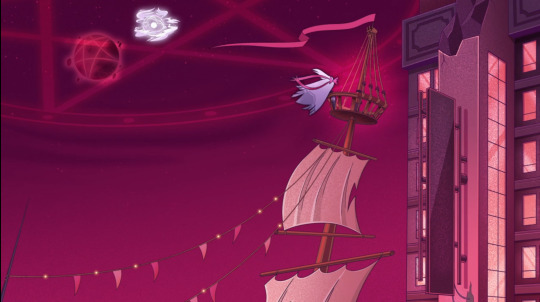
Throughout the song the conflict between Heaven and Hell is mentioned by Carmilla and is present in subtext in Vaggie's stanza, as she looks at her old home.
Both are struggling under the pressure of these truths and are confronted by a loved one:
Zestial: Carmilla, what troubles thou? Losing thy composure is unlike thee. Carmilla Carmine: It's nothing, Zestial, really.
Charlie: Vaggie, don't say that! You do so much! It's- Vaggie: I'm sorry. I'd… I'd like to be alone for a minute.
Carmilla chooses to open up to Zestial and tells her daughters how much she loves them. Vaggie instead closes herself off and refuses Charlie's attempt to talk. She is singing to Charlie, but Charlie herself isn't present to hear her out. Even when it comes to their respective secrets...
Carmilla says hers in the song:
Carmilla Carmine: I always thought that I would keep blood off my face But when that thing attacked, I had to act To cross that line and keep them safe But if anyone knew, then all of Hell would rise to war And who's to say who'd survive the fray? I might lose the ones that I was killing for
Vaggie only alludes to hers in the lyrics:
Vaggie: When I saw your face You made me feel like a stranger in a brand new place And it felt so good to be understood But there's so much I wished that I could say
Vaggie meets Charlie and feels like a stranger in a brand new place because at the time she is in fact a stranger in a brand new place:
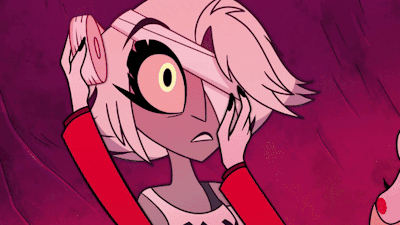
So, Carmilla is able to express herself, while Vaggie can't. This isn't surprising, as Vaggie is basically a child-soldier:
Adam: Do you really think I wouldn't recognize one of my top girls just cuz you're out of uniform? You were on the front lines, I wouldn't forget a bad bitch like you. It's why I named you after the best thing ever. Vaggie.
She is brought up in Adam's army and is taught that love is conditional. She is one of Adam's best fighters, but the moment she makes a "mistake", she is discarded:
Lute: Sinful filth like you has no place in heaven.
This is why she feels Charlie will love her only if she is useful and never messes up:
Vaggie: I'm supposed to make your dreams a reality. I'm supposed to protect you. I'm supposed to never fail you. (...) If I can't help you, what's the point of me?
This fear of abandonement and rejection is also at the root of Vaggie's inability to tell Charlie about her past:
Adam: I guess I'll just tell little miss butterflies and rainbows that she's been fucking someone who's killed-- thousands of her people. I'm sure your relationship will be fine.
Still, despite her communication issues, Vaggie's heart is in the right place:
Rosie: If there's anything I've learned, it's that words are cheap, but actions, they speak the truth. So, what have her actions said?
Vaggie is a person of few words. This may be why she has less songs than other characters. Still, she lets her actions speak, so she is given a ballet lesson by a very talented ballerina:

DANCING THROUGH LIFE
Carmilla has a ballet motif, as her outfit resembles that of a ballerina and her two daughters are called after protagonists of famous ballets. So, it is only natural that she teaches Vaggie a new way to fight through dancing.

Vaggie was taught to fight with hate and anger. So, her fighting style is aggressive and focused on attack:
Carmilla: You leave yourself open with every swing. You fight like someone unafraid of harm, and this is what you'll take advantage of. Angels wield no shields, little armor and fight with reckless abandon.
Carmilla tells her she should instead dedicate herself to love, protection and defense:
Fuel yourself with the fear of losin' That somebody who's your reason to live Harnеss your heart and you can't help choosin' To fight with all you can give
Vaggie shouldn't just fight. She should dance:

She shouldn't hate:
I see you're driven by your detestation Your every step is stoked with animus You need a different type of motivation Or there's no way that you can handle this
She should love:
Out for love~ Love~ Think of who you care about Protect them and be out For love~ Love~
Vaggie listens to these teachings and applies them in the finale, in two ways.
She sings her love for Charlie in More Than Anything Reprise:

Vaggie: You've already done so much So many lives you've changed So many souls you've touched And in the end, if it's only me you've saved Charlie and Vaggie: There's something that I've been dying to say More than anything, more than anything Need you to know I love you more than anything More than anything
As stated above, Vaggie doesn't sing much in season 1, but in the final episode she gets a short moment to express how she feels to Charlie. This is in contrast to Whatever It Takes, where she sends her girlfriend away before she starts singing. More Than Anything Reprise shows Vaggie's progress when it comes to self-expression.
She follows Carmilla's advices while fighting
On a practical level she covers herself up in a battle suit inspired by Carmilla's outfit, she wears a harness on her heart and ties her hair:
Vaggie: I'm not used to fighting with long hair.
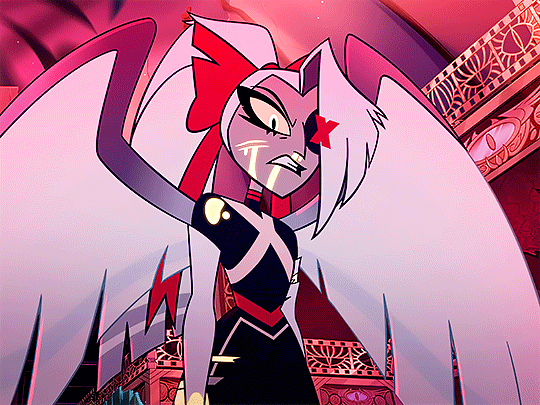
On a thematic level she reveals her wings and defeats Lute, when the exorcist threathens Charlie:
Lute: So, I'll spare you the pain of seeing your demon bitch die.
And Vaggie eventually chooses not to kill the other angel:
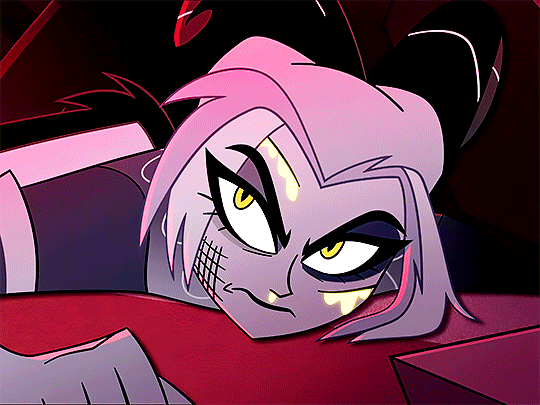
Lute: Do it, then. Correct your mistake. Vaggie: Seriously, you're pathetic, you know that? Ready to die rather than accepting mercy? No, live. Live knowing that you only do because I let you, the failure.
Vaggie is asked to choose between her hate for Lute and her love for Charlie and she chooses the latter. This is why the scene ends with Vaggie leaving Lute and flying to help Charlie. She is given the chance to get revenge, but doesn't take it. She is given the chance to hate, but she loves:
I know you're thirstin' for vengeance, Vaggie You're out for blood But you'll only stand a chance if you're out for love
This is important in two ways:
1- The macrochosm - Vaggie refuses Lute's ideals and defies her expectations. For Lute it is normal that Vaggie is going to kill her. After all, Vaggie is discarded because she shows pity to a sinner, which makes her weak. Still, Vaggie bests Lute in a fight, so she is now strong. It is only obvious then that Vaggie has snapped out of her foolery and is ready to kill. She can correct her mistake. She did not kill the cannibal child, but she can kill Lute. This is how Lute understands the world. And yet, Vaggie doesn't finish her off. By doing so, she moves away from the mentality Lute embodies. She is strong precisely because she can show mercy. Adam is wrong. Lute is wrong. Vaggie isn't out for blood. She is out for love.
2- The microchosm - Vaggie sparing Lute isn't just the morally correct choice, but it is Vaggie's first step into healing:
Husk: (To Vaggie) This one. Judges everyone and everything because she hates herself.
Vaggie hates everyone because she deep down hates herself. She despises Heaven and Angels because she can't forgive her involvement in the exterminations. So, Vaggie hurting Lute would be Vaggie hurting her past self. As a matter of fact Lute is Vaggie's dark mirror. She is who Vaggie might become if she gives in to hate.
A person who hurts others:

And herself:

Vaggie instead has to value her life, so that she can protect others. She must save others and heal herself. Only in this way she can be by Charlie's side. She needs to let go of self-hate to embrace a healthy love. Vaggie's arc is her learning self-love through her bond with the Princess of Hell.
Obviously this journey is just at the beginning and our Angel of Love has a long way to go. How will her story contiue? We can make some hypothesis, which once again stem from Vaggie and Carmilla's foiling. This is just a theory, so take it with a grain of salt, but Vaggie may have a secondary personal antagonist in Hell:

Why is that so? It's because Scrambled Eggs sets Vaggie and Velvette up as foils.
RESPECT(LESS)
Velvette and Vaggie are opposites in their interactions with Carmilla. Both girls are younger than the Dancer Overlord and could learn a lot from her. However, Velvette refuses any kind of mentorship and shows no respect:
Velvette: Mad that I acted respectless? Well, it's cause no one could respect this! You're long past trending! Sorry, bae, but I ain't swiping right! You've lost your relevance-
Vaggie instead comes to respect Carmilla and learns from her:
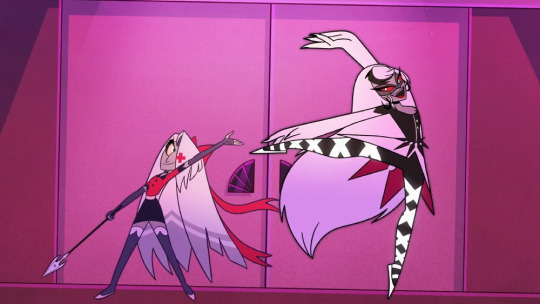
At the same time, both Velvette and Vaggie confront Carmilla about her secret:
Velvette: 'Oops!' Did I strike a nerve? 'Cause when I brought out the angel's head, couldn't help but observe, that your wrinkled face was turning red! And why are you avoiding war? That's what the guns you sell are for! Thanks to my being respectless, one thing I'm starting to suspect is You know why this angel's headless! Do you have a disclosure?
Vaggie: I know what you did on extermination day. We can talk about it inside, or I can yell about it out here.
They call Carmilla out on killing an angel and keeping this knowledge to herself. Not only that, but both argue that it is necessary to fight back to stop the exterminations:
Velvette: We found it during Extermination day. If these Holy Rollers can be killed, the game has changed. We can take the fight to them. The boys and I have come up with a full assault plan!
Vaggie: Miss Carmine, I'm here on appointment from the princess to enlist your aid in the defense of hell from the angelic extermination. We know an angel fell at your hands and we need to know how.
Still, Velvette fails to get through to Carmilla because she uses war rhetoric:
Velvette: Oh, I get it. So Grandpa is too pussy to fight, so I guess there's no point, right? Oh, what's the matter, Fossil? Too senile to make a real power grab...
She speaks of violence, strength and power.
Vaggie instead convinces Carmilla to help because she mentions the necessity to fight for loved ones:
Vaggie: We didn't pick this fight, but it's here now. And they aren't going to stop with us. You didn't see the look on their leader's face. With us out of the way, it's only a matter of time before they come for the rest of you. They won't stop until all of hell is wiped out, so you can help us make a stand here together, or you can stand alone tomorrow.
She speaks of protection, love and comraderie.
In short, Vaggie succeeds where Velvette fails. Of course, this is true for Charlie's group in general when it comes to the Vees:
Vox: My dear people! We at VoxTek Enterprises have always been at the forefront of innovation. And now, with this new oncoming threat, we are shifting our focus, to your protection. We are pleased to announce VoxTek Angelic Security is coming soon! Trust us, with YOUR safety.
Katie Killjoy: Breaking news - Extermination day is cancelled! Charlie Morningstar managed to fend off the angelic attack with more than just nice words.
The Vees make big declarations of how they are gonna protect the people of Hell, but in the end it is Charlie and her friends who fight for the sinners.
When it comes to Vaggie and Velvette specifically, it is going to be interesting if their foiling is expanded. If so, then I guess Velvette is gonna help Vaggie mature a little bit more, so that when our ex exorcist faces Lute (her nemesis) again, she is gonna be ready for it.
#hazbin hotel#vaggie hazbin hotel#vaggie#carmilla carmine#velvette hazbin hotel#chaggie#charlie x vaggie#hazbin hotel meta#my meta#asksfullofsugar#anonymous#hazbin lute
148 notes
·
View notes
Text
The Silence Between Us {NH13}
Navigation
Synopsis: Y/N, torn between loyalty to her best friend Ava and burgeoning feelings for Ava’s ex, Nico, finds herself caught in a destructive emotional web that leads to betrayal, guilt, and heartbreak. As the consequences of her actions unravel, she grapples with the painful realization that love and loyalty cannot coexist without sacrifice, leaving her isolated and irrevocably changed.
Warnings: Emotional Distress and Trauma, Betrayal and Trust Issues, Guilt and Self-Harmful Thoughts, Relationship Dysfunction, Emotional Manipulation and Gaslighting, & Heavy Themes of Heartbreak and Grief.
Themes: Guilt and Self-Betrayal, Emotional Conflict, Betrayal and Friendship, Love as Destructive, Loneliness and Isolation, & Moral Ambiguity.
WC: 2.8k
A/N: been sitting with this for awhile, not sure how I feel about it.
Join my Taglists here or message me
• you DO NOT have my permission to copy my work, upload as your own, translate, or repost on any other website •

The soft hum of the city barely reached the confines of Y/N’s apartment, its warmth washed away by the evening chill that seemed to seep into her bones. Outside, the New Jersey skyline glittered, the cold streets reflecting the faintest traces of light, but inside, the world was silent except for the slow rhythm of her breath. The weight of the day pressed down on her, more than the dim light or the soft tick of the clock on the wall.
Ava. Her mind kept returning to her best friend. The image of Ava’s tear-streaked face, her voice cracking as she tried to make sense of everything, had been etched into Y/N’s memory. “I don’t understand it, Y/N. He said he loved me, but then he just... left.” Ava had been inconsolable after her breakup with Nico—his Nico—her ex, and Y/N had been there, doing what best friends do. She had given Ava her shoulder to cry on, wiped away the tears, and tried to soothe the ache that Nico had left behind.
But in those moments, when Ava’s world was falling apart, something else had quietly begun to shift. Nico. The man who had once shared everything with Ava had started to share his vulnerability with Y/N, too. The truth was, she had always been drawn to him, but she had buried it deep, buried it under the weight of friendship, loyalty, and unspoken boundaries. Yet now, there was a spark—something undeniable. Something that made her heart skip every time his name popped up on her phone screen.
The first time they had met outside of the group, after the breakup, had been completely accidental. Y/N had been grabbing a coffee at a local café when she had run into Nico. He had been quiet, distant, the same way he always seemed when the weight of the world pressed on him. But something about the way he looked at her that day—like she was the only person in the room—had set something off inside her.
“Y/N,” Nico’s voice had been tentative, almost unsure, as if testing the waters between them. “I know this is... awkward. But I just... I didn’t want to lose you, too.”
She had smiled, her own heart inexplicably tightening at the vulnerability in his eyes. He was always so composed on the ice, so careful with his words in front of others. But here, in the quiet of the café, with the cold air between them, he was stripped bare.
“I know, Nico,” she had said softly, even though the words didn’t feel real. “You didn’t lose me. I’m still here.”
And she had meant it, in that moment. She had wanted to be there for him, for both of them, in whatever way she could.
But now, here she was—sitting in her apartment, staring at her phone, waiting for a message that she knew would come. Nico always texted at this time of night. It had become a ritual of sorts, a thread between them that neither of them seemed ready to sever.
Her phone buzzed.
“You up?” The message was simple, familiar.
Her fingers hovered over the screen. Her chest tightened as she debated what to do. She couldn’t lie to herself anymore. The tension between them was undeniable, and the guilt of it all—of the betrayal she was already committing, even if just emotionally—was unbearable. She had always known it was wrong to feel this way about her best friend’s ex, but there was something about Nico that made it feel like the most natural thing in the world.
With a deep breath, she typed back.
“Yeah. What’s up?”
A few minutes passed, then another text came through.
“Can I come over? I... I just need to talk.”
Her pulse quickened. She knew what this meant. The lines had already blurred between them, and yet here she was, allowing it to happen.
When Nico arrived, his face was as familiar as it always had been, but the weight in his eyes was heavier tonight. Y/N opened the door, stepping aside to let him in.
“Hey,” he said softly, almost too softly, like he was afraid of disturbing the air between them.
“Hey,” she replied, her voice unsteady, though she tried to mask it with a casual smile.
They sat on her couch, an awkward silence hanging between them. Nico shifted, fidgeting with his hands, his mind clearly elsewhere. Y/N didn’t know what to say—didn’t know what she was even supposed to feel. Everything about this felt wrong, but she couldn’t quite shake the pull she had toward him.
“I... I didn’t want to talk about her anymore,” Nico finally spoke, his voice low and guarded. “But I can’t stop thinking about it. About everything, you know? What happened between me and Ava... it’s all so messed up.”
Y/N nodded, unable to look him in the eye. "I get it," she said softly, though her heart was racing.
“You’ve been such a good friend to me, Y/N,” Nico continued, his voice quiet but intense. “I just... I don't know how to repay that. You've been there for me in ways I can't explain.”
Y/N swallowed hard. She wanted to say something reassuring, something that would bring him comfort. But in the silence that followed, the way he was looking at her—the way his eyes seemed to search hers—she felt it. The thing she had been avoiding for so long. The thing she could no longer ignore.
There was something there. Something between them that neither of them had acknowledged until now.
“Nico...” she began, her voice trembling slightly. “You don’t have to do anything. I’m just... I’m just here for you.”
And then, without thinking, her hand brushed against his. It was almost accidental, but it sent a jolt of electricity up her arm. The simple touch lingered, the space between them growing smaller, tighter.
For a moment, neither of them spoke. There was no need. The air had already shifted. The unspoken truth hung between them, heavy and undeniable.
Later that night, after Nico had left—his quiet goodbye lingering in the doorway—Y/N sat alone in her apartment, her heart tangled in a knot of emotions. She knew she was lying to herself, lying to Ava, lying to Nico. And yet, she couldn’t escape the feelings that had rooted themselves deep inside her.
The silence of the apartment seemed to press in from all sides, making everything feel heavier than it should have been. She closed her eyes, trying to push away the guilt that was rising like a tide within her. She could feel Ava’s pain, could almost hear her voice asking, How could you do this to me?
The thought of losing Ava, of betraying her trust, was unbearable. But at the same time, there was this pull inside her. A pull toward Nico. A pull she couldn’t explain, but couldn’t deny either.
She picked up her phone, staring at the last message she’d sent to Nico. “I’m here for you.”
But was she? Was she really there for him? Or was she just there for herself, for the comfort of a love that was never meant to be hers?
A knock on the door jolted her from her thoughts. She stood up, her heart racing once more. She knew who it was.
When she opened the door, Ava was standing there, her eyes red and tired, the weight of her heartbreak still visible on her face. She looked at Y/N as if she already knew something had shifted. She didn’t even have to speak.
“I need to talk to you,” Ava said, her voice raw with emotion. “I... I don’t know if I can do this anymore. This whole thing with Nico, I just... I can’t understand it.”
Y/N’s throat tightened. She couldn’t do this. She couldn’t look at Ava and lie, not anymore. But how could she admit the truth? How could she tell Ava that the man she still loved, the man who had broken her heart, was now the one she was falling for?
The silence between them was a vast chasm, one that Y/N couldn’t bridge.
She wanted to tell Ava. She wanted to confess the guilt that was gnawing at her soul. But she couldn’t.
“I’m here for you, Ava,” she whispered instead, her voice faltering.
Ava looked at her, uncertainty flickering in her eyes. But Y/N knew. She knew that nothing would ever be the same between them again. Not after this.
Not after what had already happened.
And as the door closed softly behind her best friend, the weight of everything—of what she had done, of what she was still doing—settled on her chest like a stone.
For a moment, she wondered if she could ever forgive herself for this.
The door shut quietly, but the echo of it was deafening. Ava’s departure left a hollow emptiness in the room—a space that had once been filled with the warmth of shared moments now chilling in the wake of truth left unsaid. Y/N stood there for a long time, unable to move, her heart caught between the weight of guilt and the suffocating silence that stretched between her and the world outside.
Ava had looked at her, eyes searching, the raw edge of betrayal still too fresh to hide. Y/N knew what she had seen in her best friend’s face: the slow realization that something had shifted, something irrevocable had broken between them. Ava might not have said it, but she had known. She had known.
And Y/N—Y/N was the reason it had happened. She was the reason everything had fallen apart. Nico had been the catalyst, but it was her own hands that had turned the wheel.
In the quiet of her apartment, Y/N sank into the couch, her body trembling as the weight of everything hit her. It wasn’t supposed to be this way. It wasn’t supposed to feel like this. But the truth was a beast that could not be tamed. Nico was no longer just her friend. She was no longer just Ava’s protector. The threads had unraveled, and now everything was in ruins.
Her phone buzzed again, and she didn’t have to check to know it was Nico. She could feel his presence, even through a screen.
“Can we talk tomorrow?”
Y/N hesitated, staring at the screen, feeling the tremor in her fingertips as she typed a response.
“Yeah. We need to talk.”
But what was there left to say? What could they talk about that hadn’t already been laid bare? There was no way to fix this. There was no way to make it right.
The next day came with an unbearable weight. Y/N hadn’t slept. She hadn’t eaten. The hollow ache in her chest only deepened as the minutes ticked by. Nico was coming over. And with him would come the moment of reckoning—the moment when the guilt would suffocate whatever remnants of their friendship had survived this chaos.
When Nico arrived, he looked just as exhausted as she felt. His eyes were red, his face drawn tight, like he hadn't slept either. The air between them felt thick, heavy with the unsaid, a tension so sharp it could’ve sliced through the room.
“Y/N,” he said, his voice soft but strained, like it physically hurt to say her name. “What happened?”
Y/N didn’t answer right away. How could she? What could she possibly say that wouldn’t make this worse? How could she explain the feelings that had crept in, uninvited and unwelcome, only to explode into something uncontrollable?
“You don’t get it, do you?” she finally whispered, her voice trembling. “This was never supposed to happen. I never meant for any of this to happen.”
Nico’s expression hardened, and he stepped closer. “Then why did you let it happen?” His voice cracked on the question, the accusation burning through the quiet. “Why did you let me get close to you like this if you knew it was wrong?”
The words stung, but they were true. She had known. She had known. She should have pulled away, should have shut the door the moment she realized where things were heading. But instead, she had let herself be pulled in—into something that had never belonged to her.
“I didn’t mean for it to go this far,” Y/N said, her voice breaking under the weight of the truth. “I swear to you, Nico, I didn’t... but it did. And now... now I don’t even know how to fix it. I don’t know what’s wrong with me.”
“You don’t get it,” Nico repeated, his hands balled into fists at his sides. “You’ve been there for me, and I—I let you. I let myself lean on you because I was hurting. But I never thought—I never thought—you’d be the one to hurt me.”
His words cut through her like a blade. And she understood. She understood that she had done something unforgivable—not just to Ava, but to him. To herself. She had betrayed the one man who had trusted her the most, even after everything he had done to Ava.
A breath caught in her chest, suffocating her. She wanted to run. She wanted to disappear into the night and never face either of them again. But instead, she stood frozen, caught between the two people who had once meant the world to her.
"I’m sorry,” she whispered, her voice barely audible, more to herself than to him. “I’m so fucking sorry.”
Nico looked at her, his eyes stormy with a mixture of confusion and rage. His expression softened, just barely, as if the anger was starting to crack under the weight of his own pain. “Do you love me, Y/N?” His voice was quiet now, but the question felt like a knife being twisted deeper.
Y/N blinked, stunned by the bluntness of it. She felt her throat close up, the answer heavy and unspoken between them. She could feel the guilt rising like bile, bitter and suffocating. She had wanted to deny it. She had wanted to tell herself it wasn’t real. But she couldn’t. Not anymore.
“I don’t know,” she whispered, the words spilling from her before she could stop them. “Maybe. Maybe I do.”
The silence between them stretched, suffocating. Nico’s face twisted, the hurt clear now. He looked at her with something that was almost pity—disbelief—and something deeper.
“Then you don’t understand what you’ve done, do you?” he asked, his voice low and deadly quiet. “You don’t understand how this is gonna break Ava. How this will destroy everything.”
The truth hit harder than any physical blow could. Y/N felt the weight of his words crush her chest, her hands shaking violently. The realization settled into her bones like ice: Nico wasn’t angry with her because he loved her. He was angry with her because he knew. He knew how much it hurt Ava, how much this would break her.
And it wasn’t just Ava. It was him. It was the fragile friendship they had, now irreparably damaged. It was the piece of herself she had lost in the process.
She wanted to say something—anything—but the words were lost. All she could do was watch as Nico turned away from her, his body rigid with the raw, jagged edges of betrayal.
It didn’t take long for the rift to become unbridgeable. Ava’s texts were sharp, biting, filled with anger and disbelief. She asked Y/N questions that were impossible to answer—questions that ripped at the very foundation of their friendship.
“How long, Y/N?” Ava demanded one evening. “How long has this been going on? How long have you been lying to me?”
And Y/N had no answer. No answer except the truth that was too painful to say. She had let herself fall for Nico. She had let herself become the other woman—the one who betrayed her best friend, the one who destroyed everything she had worked so hard to protect.
And when Nico finally stopped reaching out altogether, when he disappeared into his own world of ice and hockey, leaving behind nothing but cold emptiness, Y/N was left alone—truly alone for the first time in years.
The guilt became all-consuming. There was no peace to be found. There was no escape from the wreckage she had created. Ava and Nico were both gone from her life, and though neither of them had completely severed ties, neither could look at her the same way again.
Days blurred into nights, and the silence became unbearable. Every step forward felt like it brought her closer to a chasm she wasn’t sure she could crawl out of. She had lost herself somewhere in the mess of emotions—lost her own sense of right and wrong, lost her identity in the wreckage of love and guilt.
And the worst part? She would never get any of them back.
She would never be able to fix this.
There was no happy ending in sight.
And she deserved that.

#x black fem reader#x black!fem!reader#x black!reader#x reader#x black reader#nico hischier fanfic#nico hischier#nico hischier smut#nico hischier x black!reader#nico hischier x black reader#nico. hischier x black y/n#nico hischier x reader#nico hischier imagine#nico hischer x reader#nico hischier x oc#nico hischier blurb#nico hischier fic#njd#nj devils#nico hischier au#nico hischier angst#nico hischier fluff#nico hischier fanfiction#nh13#nh13 x reader
28 notes
·
View notes
Text
WHAT IT FEELS LIKE IN THE HOTD FANDOM RIGHT now as someone who is disappointed in the show's handling of team green and really just critical the show's writing in general
Team Green Stans and/or HOTD critics:
"I know I'm going to get a barrage of criticism or even hate/harassment for saying this but...
HOTD's writing is rather biased and strays from the source material in ways that are frequently ridiculous, fails to actually improve the story, and totally ignores the anti-war and the general targ/ruling class critical tone of GRRM's writing.
Yes villain or dark character centric shows can be really good even when the purpose of the story isn't to condemn their actions- BUT purposefully changing an adaptation of a story so that it no longer contains the original message/themes that did criticize the characters and their actions is at the very least a questionable writing choice.
The characterization and the messages of the show are inconsistent in a way that doesn't feel intentional or in order to make a point- instead it just doesn't make sense. ALL characters suffer due to the choices of the writers/showrunners- including team black- but team green is obviously getting the worst of it (seriously its cartoonishly bad). It's all so nonsensical and frustrating that it's getting harder and harder to watch- really at this point its no longer even a fun bad! show that can still manage to be entertaining even when the story itself sucks.
Much like with d&d with the later seasons of GOT it's disappointing to see the poor quality of work coming from paid professional writers, this could have been a show about a tragic and dramatic conflict between characters who are mostly bad people yet are still compelling or sympathetic and instead we got ...well...this."
Some Team Black Stans:
"Come on people HoTD is an adaptation so of course things will differ from the books but the show still stays true to the heart of the book, the changes were not a big deal- in fact some were good choices by the showrunners making more disturbing and violent aspects of the book more palatable for the audience without lessening their emotional impact... B&C was toned down not to whitewash team black but because no one should want to see the multiple child homicides from the book take place on screen...and the violence here really isn't as important to the plot as it was for say GOT's red wedding... toning the violent or horrific nature of these deaths down and having it occur off screen is the right thing to do! It's still sad- and this way we didn't need to traumatize the actors OR the audience!
Really people just stop complaining... both sides of the conflict are presented as EQUALLY culpable and in the wrong as the other side, team green stans are just missing the subtle points being made in the show and are exaggerating when they criticize the writing or supposed inconsistent characterization and accuse the showrunner's of being biased.
These TG stans are just being so mean and should stop criticizing the writers/showrunners-who are just doing their job!- and even if they feel they have to criticize the writing it's really just so inappropriate to ever specifically name the writers/showrunners when doing so! It's one thing for fandom to anonymously criticize other fans- especially since TG Stan's takes are so misguided that they obviously need someone to explain to them how they are misinterpreting things- but criticizing the professional writers and showrunners through tumblr posts is out of line! Its not the writer's fault that Alicent and TG are hypocritical or less likable than TB- that may just be how they are in canon- to say that the storytellers are purposefully changing things to make TG less sympathetic or competent than they were in the books and to set them up as the unlikeable antagonistic opposite to the now more tragic and heroic TB is a ridiculous accusation!"
Other Team Black Stans:
"Daemyra is just the best ship, they have loved eachother since she was a teenager and now after years of pining and being kept apart they are finally free to be together, you never see supportive or healthy relationships like this in asoiaf, we stan a man who will do literally anything and kill anyone for his niece wife.
Lucerys was just an innocent baby when he sliced up Aemond's face, he was just protecting his big brother, it only happened because he was afraid for their lives! Viserys made the right choice not to punish anyone since the team black kids only attacked Aemond after he stole Rhaena's dragon and Lucerys was only using self defense when he used a knife on Aemond. Most especially Lucerys and his mother didn't deserve to be attacked by that bitch Alic*nt. And Rheanyra trying to have Aemond tortured for calling her sons bastards was just her being a rightfully protective mother! Team Green means her family harm and no way will a bamf like Rhaenyra let that slide... this is what a good mother does not like that terrible Alic*nt! Lucerys' death was so tragic can't wait to see a grieving mother get her revenge... TG believes in an eye for an eye don't they? Well how will they like a son for a son?
TG stans keep saying that Rhaenyra is just as violent entitled and problematic as anyone else on hotd! They are so wrong! They are just delusional haters that can't stand to see a woman have sexual freedom and be in a position of power! She is the better daughter/wife/mother and the only people she hates are the ones who deserve it!
See she isn't evil like the Hightowers- B&C was an accident and the book description was exaggerated to be used as propaganda against Rhaenyra- she didn't even know it was happening. It wasn't even team blacks intent to kill little Jaehaerys only to kill Aemond- but he's a kinslayer so them sending someone to assassinate their nephew/brother is totally in the right and not something any character in canon would judge them for!... Rhaenyra is just too good of a person to wish harm on any of her innocent family members. Everything that happened to Rhaenyra, Rhaenys, and Meleys is just so tragic... they are the only true queens in this series ...god i wish all of their pain was only experienced by team green lol.
You know what ...are TG stans children or something? Why do they keep complaining that team green is being unfairly villainized to make team black look better? Don't they know they can just watch a show where the characters are flawed/bad people without needing the story to spoon feed the audience the message that bad people need to be condemned? Why do they take things so seriously? Why is this their whole personality? Get a life and stop overthinking a book/tv show -not everything needs to be deep you know so just shut up and enjoy watching the dragons destroy things.
But for real how can you people stan misogynistic women haters like team green or a trad wife/women for trump like Alic*nt? Like yikes what does your fictional character preferences say about you as a person. Hey EVERYBODY look these weirdos are really out here defending and woobifying violent predatory and sexist characters like team green! This fandom is the worse i swear lmfao."
Meanwhile...
Showrunners/Writers:
"What if the civil war, brutal violence, and tragic kinslaying that happened in the dance of dragons was really just a series of accidents and misunderstandings?
What if Rhaenyra and Alicent were friends who never really hated one another, and Alicent was pining for Rhaenyra's friendship and acceptance for the last 20 years, what if neither of them even wanted to go to war?
Who cares about house stark or the pact of ice and fire, or Jace's interactions with Cregan or Sara? You know what Sara Snow doesn't even exist, Jon i mean Jace would never betray his betrothal/loyalty/vows to his dragonrider soulmate and future wife for some stark girl! This whole stark side plot isn't important lets just go back to the dragons!
What if Rhaenyra wanted the throne because she knew that from her descendants the prophesied saviour/prince that was promised would be born? What if instead of her surviving son Aegon being so traumatized by the horrors of this meaningless war that he actually hated and feared dragons afterward- and supposedly was even responsible for killing the last one- it is Rhaenyra who was actually responsible for saving Daenerys' future dragon eggs- and thus she the one who ensured the return of dragons to Westeros! It will be Rhaenyra through her choices and her descendants that will be responsible for saving the entire realm and defeating the others with dragon fire!
What if Alicent pushing her son to be crowned was all because she was a fool who misunderstood the words of her dying husband NOT because she felt her son was unfairly robbed of his birthright by his father?
What happened with Daenerys in the later seasons of GOT was so unfair- just terrible writing -she NEVER should have been made out to be a mad queen and i bet Rhaenyra wasn't actually a cruel or violent ruler either! I bet it was the men who slandered her, and the men who were pushing for war and violence while all the women were actually trying to keep the peace.
Wait...wait.... What if everything in the book that criticized Rhaenyra was actually propaganda made by her enemies to ruin her reputation!?!!? Yeah B&C and team black arranging the horrific murder of a child? That story was TOTALLY team green exaggerating the violent murder of their child/grandchild. Daenerys I mean Rhaenyra deserved so much better... and all the injustices that happened to her will be the most impactful and tragic element of this show.
What if TG didnt actually have strong bonds with their dragon or spend much time riding them?... just more propaganda! Yes! CGI is expensive so this also means we dont really have to show their dragons unless they are fighting the blacks. Team Black's bond with their dragons is much more powerful and important though so we should still show them spending time together and riding them.
What if the book description of the respect and loyalty team green had to one another and the terrible grief they felt at the loss of their family members was ALSO just team green propaganda? What if Alicent only ever struggled as a mother and failed to connect with her kids and actually didn't even like or respect her children? How many kids did she have anyway? Three? Yeah that sounds right. Oh wait! Wait! What if none of TG got along with or trusted one other? No...no...What if they actually hated and betrayed each other? YESSSS!!!!!!!
Team black and their descendants are the true Targaryens, no one is really interested in the boring team green anyways so at least these changes will make them more interesting and better foils for team black! This type of story is exactly what people want I just know they are going to love it."
NOTE: (because i know idiots will be lurking in the anti tags to complain or harass people)
this is mostly meant to be very critical of the showrunners and somewhat critical of a specific type of stanning behaviour and the weird criticism or harassment that gets directed at people who like team green or who criticize hotd - sure i may be exaggerating slightly for effect but l'm STILL pulling from real posts/comments/opinions that I see from TB stans ...Like sure they aren't putting ALL of this in a single post but collectively this is definitely the type of attitude and language many TB stans have
Fandom is just about enjoying a special interest - I dont actually care about or want to police who you stan or ship. I DO care that some of you purposefully and directly harass real people because you disagree with their opinion on fictional characters and that some of you leave uncharitable, ignorant, critical, or unpleasant comments on properly tagged Team Green/anti or TB critical/or hotd critical posts.
Most of all i just find it really funny the juxtaposition there is between how underwhelming and juvenile the show's storytelling choices are compared to how eloquently, persistently, or vehemently fans will write up either criticism or defense pieces for these characters, this objectively bad show, and it's deeply unimpressive writing... like sure some fans put more effort into understanding the source material and comparing it to the show and some put more effort into criticizing or defending the show,the writing, or specific characters but collectively nearly all of us are putting in more time, effort, and thought into hotd than ANY of the showrunners/writers.
In conclusion Guys just like or dislike whatever show/characters you want...you don't have to justify the things you like by being willfully in denial about what canon sources say/the nature of certain characters/or the quality of the show's writing. You definitely don't need to be disrespectful or attack people on behalf of fictional characters or the well paid hbo showrunners/writers.
#some of TB stans takes or criticisms on TG/anti hotd posts have put me in a snarky mood#so here is a summary of what it feels like to be criticizing hotd right now#prepare yourself i intend to be bitchy#anti hbo's rhaenyra simping and whitewashing#anti hbo's team black simping#hbo's hotd critical#team green#anti team black stans#hotd fandom critical#anti targ stans#anti daenerys targaryen#anti daenerys stans#anti daenerys defense squad#Crimson Cold thoughts#anti team black#anti rhaenyra targaryen#anti lucerys velaryon#anti daemyra
82 notes
·
View notes
Note
hihi !!
could you do something with TF141 (or just Soap, Ghost, or Price… I’m not picky lol) and a reader who’s biological father decides to come back randomly to try and have contact again?
tbh it’s something i’ve been struggling with for a bit- i let my bio father have contact with me again despite the stuff he put me and mom through for lack of a better term. i have my sister and the family on that side who i want to be able to have a normal relationship with and im tired of being scared and avoiding him. it’s just been difficult bc i have a dad who hasn’t hurt me and it’s not my bio dad yknow??
sorry for the mini dump- if it’s too much or you just don’t wanna do it feel free to ignore! thank you lovie!!

Author's note: Hey I'm so sorry for not getting to this sooner! I have been super busy and honestly I didn't want to half ass this request since its pretty sensitive but I hope you enjoy
Warning(s): Triggering themes that include: Parental Abandonment, Family Conflict, Emotional Distress/Abuse

Sweat clings to the babyhairs on your forehead as you stare at your phone screen. The text message was laid out before you and you couldn't tear your eyes away. Your fingers were unable to type out a response, your brain was scattered not only from the mission you just came back from but from the particular individual you had received this from.
"Lass?"
You hear Soap's throaty Scottish accent from behind you and it takes a moment to unglue your eyes from your phone. His eyes soften when he skims over the message, and then to you. A tear has brimmed in your left eye and he feels his heartstrings being yanked at. Life could be cruel at times, especially when it came to absent parental figures.
"You alright?" Ghost's voice comes in from your right side and you sigh.
"Not really..."
"You don't have to answer." He adds.
The look in Ghost's eyes says it all. Familiar with the nuances of paternal mistreatment, he feels well-equipped to comfort you. A gloved hand on your shoulder and you feel your body relax a bit.
"I know." You nod. "I just--my sister and the rest of my family on that side, I want to have a normal relationship with them."
"But you feel held back?" Soap sits beside you on the bench. You nod again. It's definitely an uneasy feeling. Like an itch under the surface of your skin that you can't quite itch.
"It just really hurts--" You choke out a sob and you feel a taut arm wrap around your shoulder as your face burrows itself into the Scotsman's neck. The comforting scent of his deodorant welcomes you, and you feel the hot tears begin to prick at your eyes. Soap's arm tightens around you, offering silent support as you let out all your pent up emotions.
"Take your time, lass," He lulls you." "We're here for you."
Ghost shifts a little, his presence anchoring you. “You don't have to do this alone,” he mutters softly. “No matter what, we’re right behind you.”
You shakily inhale and lift your head to meet their concerned gazes. “I know,” you reply inaudibly, wiping tears from your face with the back of your sleeves. “But… I just wish I could have a normal relationship with my sister and the rest of my family. I just can't shake the fear of facing him."
He examines her for some time before something seems to sink in. Ghost's eyes harden slightly, a flicker of understanding passes through them.
"'s natural to feel tha' way." He begins. "But remember tha' you are at liberty to set boundaries. You do not owe him anything simply because he is your biological father."
Soap nods in agreement with his counterpart, “Ye need to do what's best for you, lass. If it means keeping away from them completely then so be it." He brushes the hair away from your face and smiles. "We'll support ya."
Taking a deep breath, you feel relief wash over you, the weight on your chest beginning to lift as you realize they will always be there to support you. Ghost ruffles the top of your head, and you lighten up a bit more.
"Now c'mon, let's get inside. Lord knows Soap needs a shower," Ghost says, his voice tinged with dry humor.
Soap pouts up at his Lieutenant. "Hey!"
The giggles that escape your chest are enough to make Simon smile. Your own smile melts his hardened heart, all it takes is some ribbing on Johnny. Sly dog.
#call of duty#call of duty imagines#simon ghost riley#call of duty x reader#simon riley x reader#soap x reader#cod#john soap mactavish#soap mw2#soap mactavish#soap call of duty#johnny soap mactavish#simon riley x you#simon ghost x reader#ghost x reader#task force 141#141 x reader#ghost x you#johnny mactavish#sergeant soap#ghoap#ghoap x reader#ghoap fluff#ghoap x you
147 notes
·
View notes
Text
Playwriting
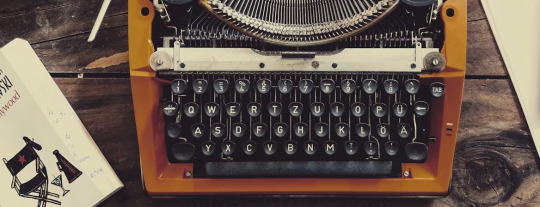
Playwriting - the art of crafting a dramatized narrative for a theater production.
Much like a screenwriter drafts screenplays for television and film, playwrights compose playscripts for characters to perform live on stage in front of an audience.
Whether the artist chooses to write a full-length play or a powerfully concise one-act piece, this type of dramatic writing affords a great degree of creative freedom.
How to Write a Play
Whether your goal is to take your creative writing skills to Broadway or put on a performance for friends and family, you can use the following steps to pen your masterpiece:
Determine your story. Brainstorm a few ideas that translate to the stage. Consider the message of your play, and invent a central conflict that underscores what you want to say. Everything in your narrative will happen live on stage, so keep production elements like space and special effects in mind. If you have a complex or surreal concept, think of a creative way to represent it physically. Read other plays by famous dramatists, such as Shakespeare, Henrik Ibsen, Samuel Beckett, David Mamet, Arthur Miller, and Tennessee Williams, to draw inspiration, set the pacing, or even help determine the scope of your own world.
Determine the main character. Stage plays are largely character-driven stories. Believable fictional characters are unique, relatable, and three-dimensional. A character’s motivations inform their actions and decisions, creating the narrative arc in the story. Identify the protagonist (the main character) and their goals, traits, and backstory. Craft a compelling antagonist to bring conflict to the main character or supporting characters. Avoid tropes or clichés when crafting your main characters, which can turn an audience off. Turn to classic archetypes to invent characters who will bring the best (and worst) out of one another.
Outline your idea. Begin outlining your play by separating it into acts. Common structures include the one-act play (which is very short), the three-act play, or the five-act play. Write down the beginning, middle, and end of your play, including major story beats and plot points surrounding your main conflict. Separate your plot points into their respective acts, following a pattern of rising action (leading up to the climax) and falling action (leading up to the resolution). Keep your act breaks compelling to maintain the audience’s interest. Include a subplot or two that helps to develop your characters.
Input stage directions. Consider stage movement when drafting your playscript. Include stage directions (such as entering and exiting the stage) and any physical actions necessary to the storyline or character development. Actors need the freedom to embody the character in their own way, so don’t get overly specific with movement description. Note important elements about set design, lighting, or props. Leave time between scenes for technical elements such as scene changes or costume changes. If your play is longer than one act, include an intermission so that your audience members have a break to stretch their legs and refresh their minds.
Write your acts. Once you break out your narrative arc, flesh out the body and action of the play. Write the play out of order if it helps with your creative flow. Some writers start writing the climax or end of the play before the first act to help them avoid overwriting and to ensure that the story stays on track. Each act should contain its own arc within the larger narrative, always highlighting the play’s theme and message. Break long scenes of dialogue up with action, tension, or surprise.
Use proper formatting. Like writing for the screen, scriptwriting for the stage follows specific formatting conventions. Format your play correctly to ensure it is easy to read and looks professional. Most playscripts center and capitalize the character names on the page; indent and italicize stage directions; and center act and scene headings in all capitals. When in doubt, use script-writing software, which will automatically format your playscript and remove any guesswork.
Reread and revise. After completing your first draft, read through the entire play from beginning to end. Jot down any notes for yourself in the margins, then reread the script with these insights in mind. Check for inconsistencies (such as continuity or timeline issues), plot holes, or weak character dialogue. Ensure that the characters’ actions and behaviors align with their motivation, and tweak as necessary.
Proofread and edit again. Using the notes from your draft, take a second pass at your script. Fine-tune the dialogue and the action. Commission family and friends to read the script and provide honest feedback.
Do a table read. Ask some willing participants to volunteer for a table read, which is an organized script reading in which actors and producers read out the dialogue, stage directions, and scene headings of your play. The table read will highlight elements of your play that you might need to tweak. Pay attention to each line of dialogue and how the action flows. Apply the learnings from the table read to the final draft of your script.
Source ⚜ More: References ⚜ Writing Resources PDFs
#playwriting#writeblr#literature#writers on tumblr#writing reference#dark academia#spilled ink#writing prompt#creative writing#writing notes#writing tips#writing advice#light academia#writing inspiration#writing ideas#writing resources
86 notes
·
View notes
Text
Doctor Who as a Post-Colonial Metaphor
Recently I've been thinking a lot about how beautifully Doctor Who reflects the state of post-colonial British identity, and tumblr seems like the appropriate place to share my ramblings. So let’s see if I can explain in a way that makes sense.
I must start by putting on my obnoxious little film degree hat and reminding everyone that sci-fi is one of those genres that is highly political (as most things are, but scifi even moreso). It turns out it's pretty easy to get a sense of people's fears and anxieties by asking them to envision the future, and that's what sci-fi media does; it uses contemporary cultural standards and ideas to create a vision of what futuristic/advanced science and technology might look like, and how people might respond to it. In doing so, it ends up taking the social and political temperature of the time and place in which it's created.
As such, it's very, very common for scholars to analyze sci-fi media through this lens; even Frankenstein, arguably the first science fiction novel ever written, is often interpreted as reflecting cultural fears regarding swiftly advancing science and technology during the early stages of the industrial revolution. The Day The Earth Stood Still (1951) is another great, very blatant example of how sci-fi and politics can interact. In this movie, a Jesus-like alien ascends to Earth during the Cold War to warn the human race about their imminent nuclear annihilation. It seems corny to us now, but it's actually a great movie and I would highly reccomend it. It's rumored that the US Department of Defense read the script and Did Not Like It because the themes were too anti-war.
In other words, despite often being viewed as too “pop,” too goofy, and too unserious to have any deep meaning, pretty much any scifi story can be analyzed within an inch of its life using a meta social/political lens. It's not the only way to interpret sci-fi, but it's by far the most common. One must simply ask, “what does this vision of science, technology, and/or the future say about us as we are now?”
But anyway. Doctor Who. Disclaimer: I haven't watched the classic series so I'll focus on 2005 onward (still post-colonial so it still holds up, lol). If you've seen Classic and you'd like to chip in, please do.
Genre-wise, Doctor Who is more-or-less a space-western, a subgenre of sci-fi that incorporates Western elements—exploring new frontiers, engaging with unfamiliar civilizations, rogue figures, etc. Star Trek is the peak example of this, but there are many, many others.
Of course, the Western genre is dripping with colonialism due to its historical setting of the American West, and the racist depictions of Indigenous peoples. Space-westerns, consequently, also tend to address colonial topics. Sometimes space westerns are just as racist as normal westerns, but sometimes they use the genre reflexively, to question colonial ideals. A more progressive space-western might be more willing to “humanize” the alien cultures they meet, asking questions like, "how does one ethically engage with foreign societies?" or "When is it appropriate to intervene in a conflict?" etc.
Althought these kinds of questions come up regularly in Doctor Who, especially regarding its anti-war messaging (Time War etc.). These themes become doubly interesting when you use them to inform your interpretation of The Doctor, both as a character and as a symbol.
Consider this: The Doctor is the embodiment of an ancient and immensely powerful being with a bloody history. Their kill-count is quite literally somewhere in the quadrillions. Although they are a self-proclaimed pacifist, they are still constantly a perpetrator of death and destruction throughout the series. The Doctor, despite repeatedly and loudly choosing peace, can never seem to keep their hands clean of chaos and suffering. Doctor Who is about an entity that destroys everything they touch, sometimes on purpose, sometimes not. As an allegory for grappling with the legacy of British imperialism, I'd say it's pretty on the nose.
In this sense, not only is Doctor Who a show about colonialism, it is also a show about identity in the wake of colonialism. It's even in the name: "Doctor Who?" Who is the Doctor? What is their responsibility to the universe? What does it mean to be ancient and powerful and drenched in the blood of millions? How do they move on, become better, without falling into the same traps? What does it mean to be British?
These questions come up over and over throughout the new series, from the destruction of Gallifrey, to the Timelord Victorious, to A Good Man Goes to War, the Flux (arguably), and many, many other smaller plotlines I could mention. Even in the latest series with Ncuti Gatwa, the focus on adoption and family is in a similar vein—where does the Doctor come from? What does it even mean to be “from” a place? How much do your origins truly contribute to who you are and who you become?
How the companions fall within this framework is also interesting; if the Doctor is a stand-in for the nation as an entity, then the Doctor's companion, the everyday British person, is the stand-in for the populace. The companions are ever-changing, ever-evolving, constantly renegotiating their relationship with the Doctor. The companion's ultimate challenge is to find how they fit into the narrative of the Doctor's life, and try their best to come out the other end with a happy ending (ha).
Of course, Doctor Who is owned by the BBC, meaning it is quite literally nationally subsudized TV. As a result, althought the show is actually VERY critical in some places, the Doctor is usually ultimately sympathetic; their good intentions tend to forgive a lot of the problems they've caused. The companion is usually charmed by the Doctors' seemingly endless tragedy of a life. This is a country's state-owned media company working with it's own self-image--it's inherently a work of self-reflection, and perhaps of self-obsession, too.
It would be easy to be cynical about Doctor Who as a product of the BBC, which is state-funded (but notably not owned or directly controlled by the government!). However, I tend to think that just writing it off as propaganda because of this is doing the show a disservice. Yes, there is an inherent privilege and self-centeredness to endlessly forgiving the Doctor, but that's also kind of the whole point; it's a show about coming to terms with one's horrible past. It's a show about learning to formulate a new sense of self. To demand that Doctor Who to be less self-obsessed, to not be about British identity when it is in fact a British show for Brits about Brits, is just a bit unrealistic.
Instead, I choose to believe that Doctor Who can and does use its privilege for good more often than not. The creators tend to be very progressive (as sci-fi so often is) and they can get away with a lot of very progressive messages in the guise of a silly sci-fi show for families. Most recently, I would point to s14e3: Boom, s14e5: Dot and Bubble as examples of thinly veiled rants about the evils of capitalism, war, racism, social media, etc. To ignore or dismiss Doctor Who because it has some form of institutional backing would be doing the actual stories and writers a disservice.
Finally, let me leave you with one last point; One consistancy throughout the new series that I find very charming is the positive effect the companions always have on the Doctor. Companions come and go, which is sad, but they're each special in their own little way, and they each change the Doctor, wearing them down a little at a time. The Doctor is consistently at their worst when they are alone, removed from the people that make them want to be better.
Very often the companion's parting message for the Doctor is "don't be alone.” This can be extrapolated to mean: don't forget we exist. Don't forget to be kind. Even if you can't help your legacy, even if you can't wash the blood off your hands, you can always keep striving to be better. Keep someone around to remind you to be better. And the Doctor, more often than not, does. Because ultimately it is the companions, us the people, that make the Doctor who they are.
It’s this special brand of relentless optimism, this indomitable belief in the goodness of people and the power of that goodness that always brings me back to Doctor Who, one way or another, despite all its flaws.
Edit 11/29: corrected some info about the BBC per the comments!
#once again pls classic fans chip in#I know I missed some points#and it could use editing expanding etc#but this is the gist of it#I just need to get it out#I love Doctor who 🥲#and I love sci-fi as a field#it’s so interesting#I wrote a college paper about bill and Ted’s excellent adventure it was great#doctor who#Peter capaldi#Matt smith#David tennant#jodie whittaker#chris eccleston#ncuti gatwa#RTD#russel t davies#steven moffat#chris chibnall#film analysis#media analysis#essays#essay#media criticism#colonialism#post colonialism#post colonial#media rants#my stuff
35 notes
·
View notes
Text
R.F KUANG Books- my thoughts
I just finished reading all of RF Kuang’s work, a while ago and I have to admit, I have some pretty mixed feelings. On one hand, I totally get why she’s praised: her ambition and the themes she writes about like colonialism, identity, and power, are undeniably important. She doesn’t shy away from addressing these big issues, which is bold ofc. But at the same time, there’s something about her execution that really didn’t land for me. I wanted to connect with her characters and stories more than I actually did.
The Poppy War, for example. Rin’s journey is intense, and the story itself is brutal in a way that forces you to confront the cost of war and trauma. But for me, Rin’s character arc felt more frustrating than complex. I get that she’s supposed to be flawed and deeply affected by everything around her, but her decisions often felt predictable. By the time I got to the later books, especially The Burning God, I found myself less invested in her fate because it all seemed like a downward spiral with no real moments of reflection or growth. Yes, it’s tragic, but without that emotional depth, it became exhausting rather than impactful.
Then there’s Babel. This book had so much potential, especially with the setting in academia which i love, and the themes of colonialism and language. The concept itself is super interesting for me, and Kuang clearly has a lot to say about the exploitation and erasure of cultures. But again, I felt like the characters took a backseat to the message. Especially Robin’s struggle to reconcile his love for academia with the reality of its colonial roots is central, but his character felt flat to me. The dynamics between him and the other students had so much potential for complexity, but they nothing ever developed in a way that felt natural or believable . It was like everything was building up to this explosive conflict, but the tension wasn’t fully earned. Instead, it felt forced.
That said, I do like how Kuang challenges the reader. She’s not afraid to dig into uncomfortable topics, and her books definitely make you think. There’s a lot of depth in how she tackles themes of identity and belonging, especially in Babel, where Robin’s experience of being an outsider in an institution that simultaneously reveres and erases his heritage feels very real. But sometimes the way these themes were presented felt too heavy-handed for me. It was like the messaging overtook the story, and while I appreciate the points she’s making. Whats the point of the story if the message is the story, i want more moments where the characters could just breathe.
I think that’s where my main issue is,
I wanted more from the characters themselves. I know they’re meant to be complex and morally ambiguous, but a lot of the time, they felt more like vehicles for the plot rather than fully realized individuals. Nezha, for example, starts out as this arrogant figure you almost hate, but then we get glimpses of something deeper. Still, it felt like we never really got to explore that complexity in a meaningful way.
Kuang’s work is undeniably ambitious, and I respect her for that but I couldn’t fully connect with her stories in the way I wanted to. The themes and the politics are important, but they ended up overshadowing the characters and the emotional core of the narrative for me. I know she has a big following, but personally, her style and approach just didn’t resonate with me as much as I’d liked.
#rf kuang#poppy war#the poppy war fanart#the poppy war#babel rf kuang#babel an arcane history#babel#babel or the necessity of violence#tower of babel#babelsberg#books and reading#booklr#book review#bookworm#books#books & libraries#media criticism#my thoughts#dark academia#dark fantasy#dark aesthetic#journey to babel#robin
41 notes
·
View notes